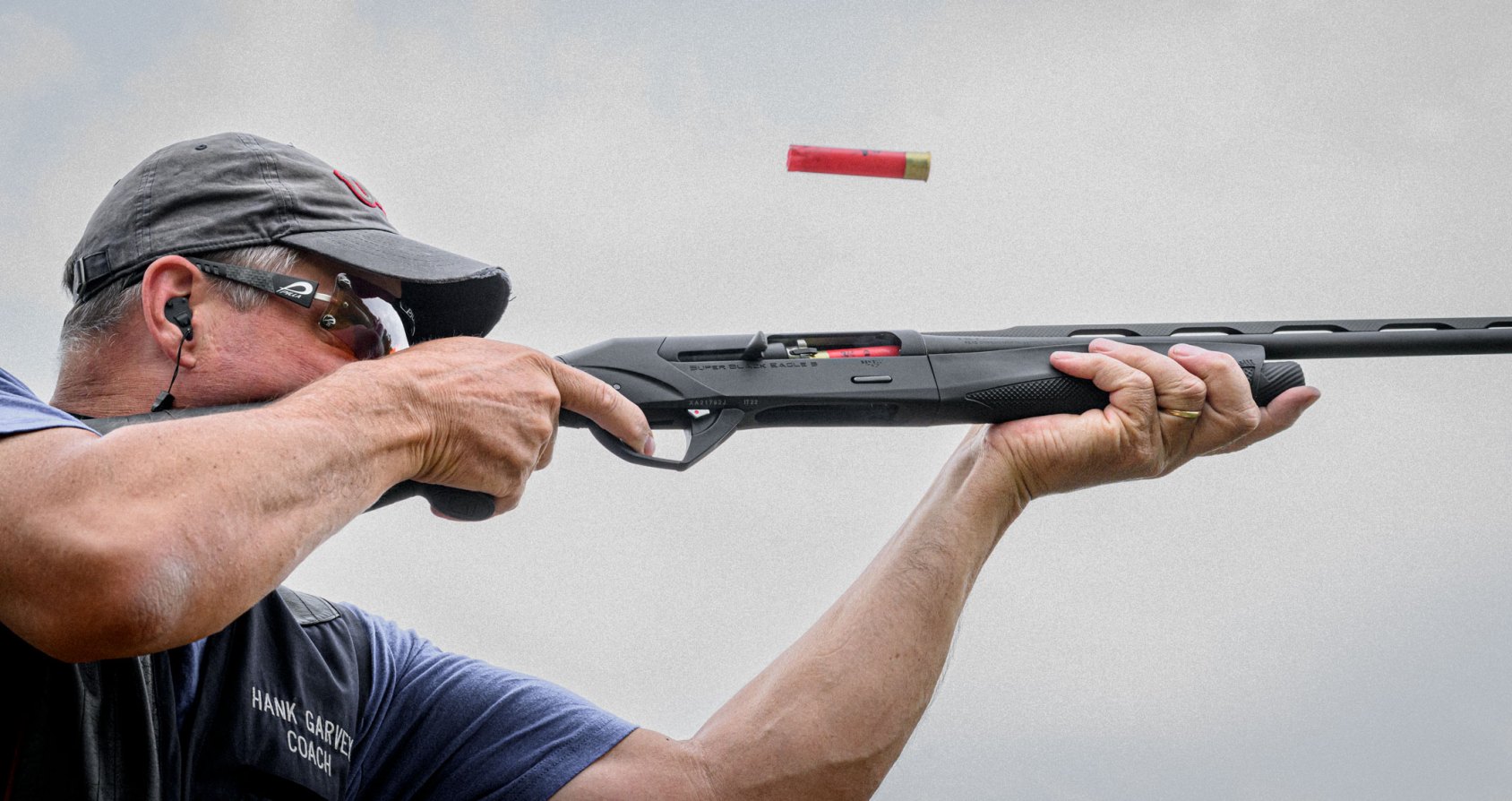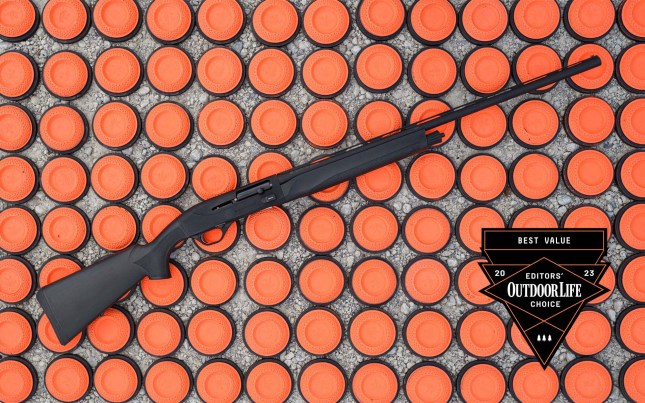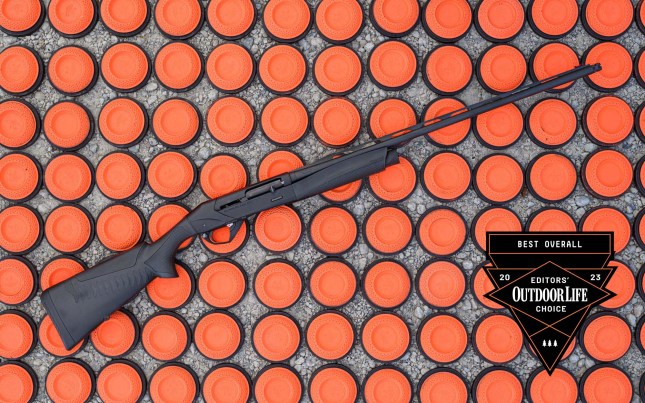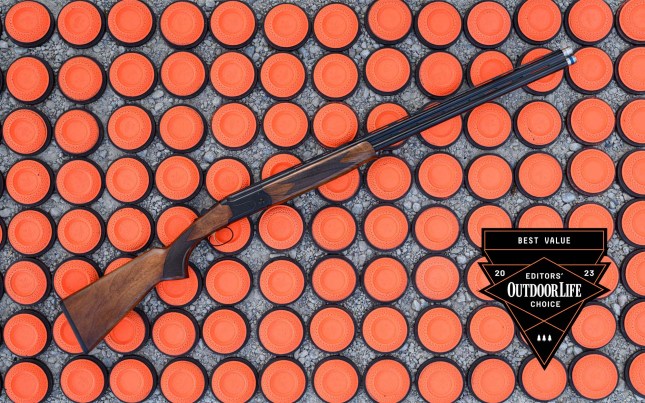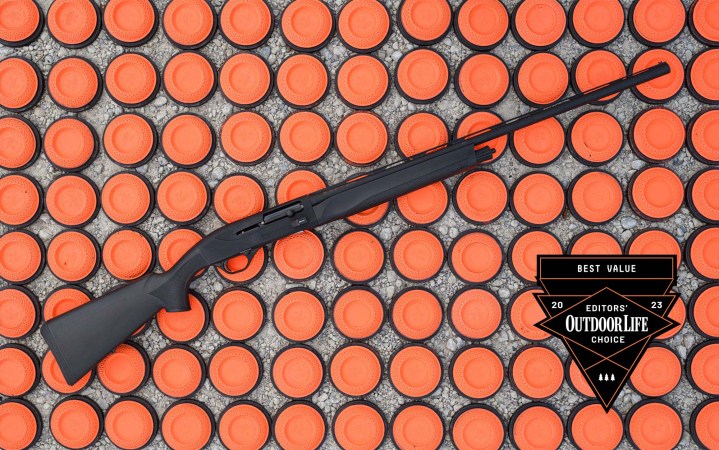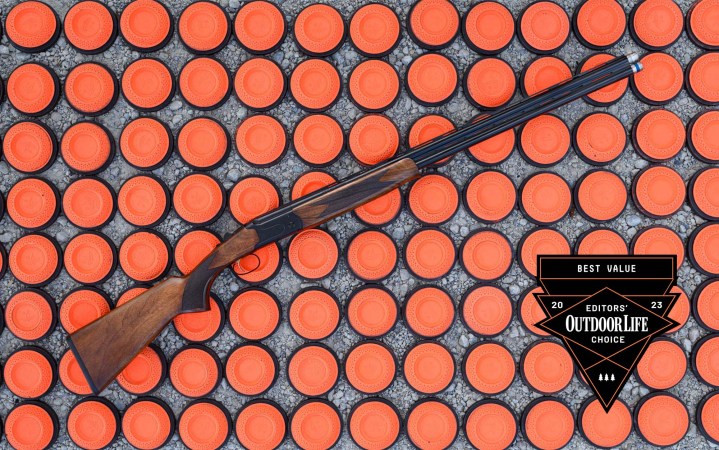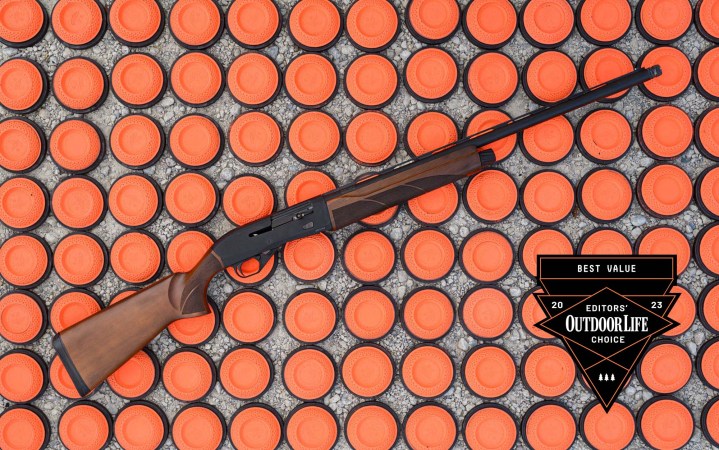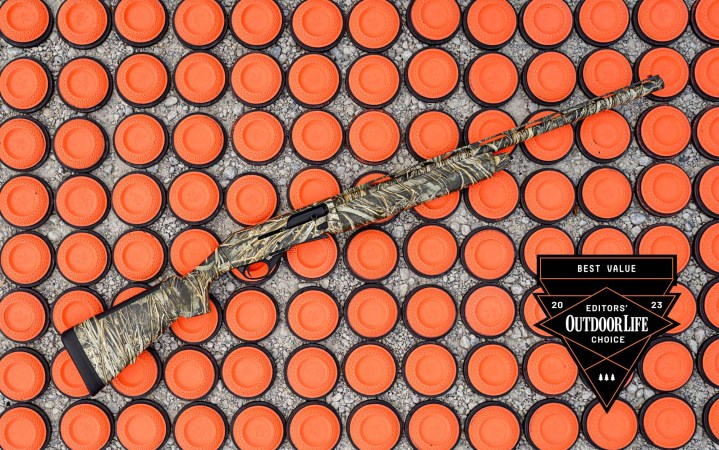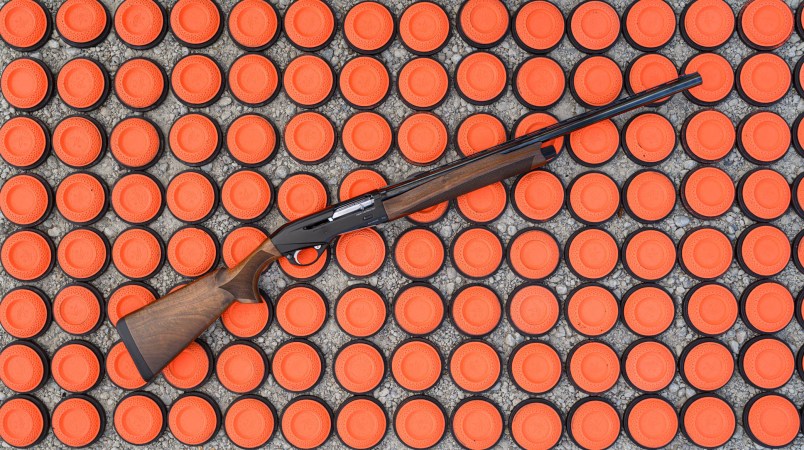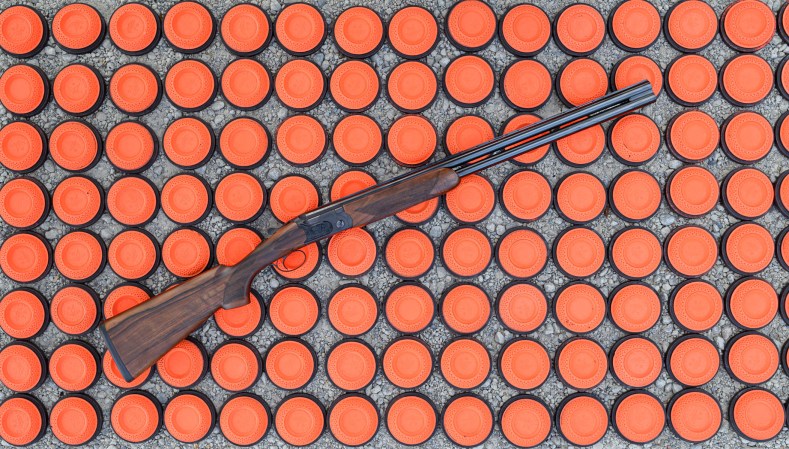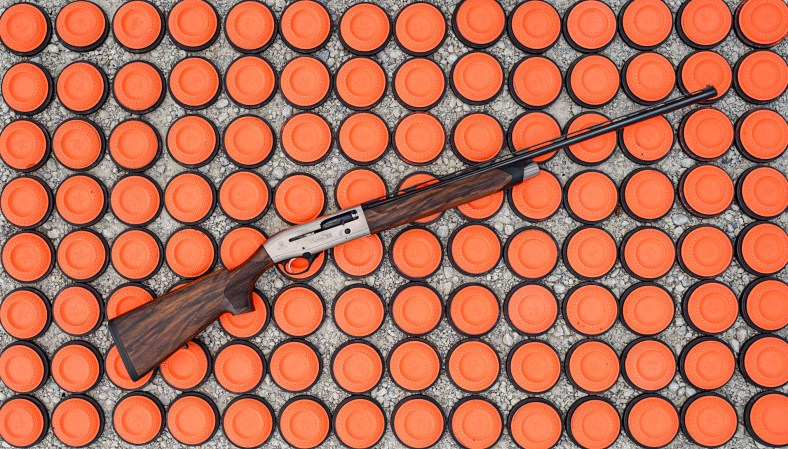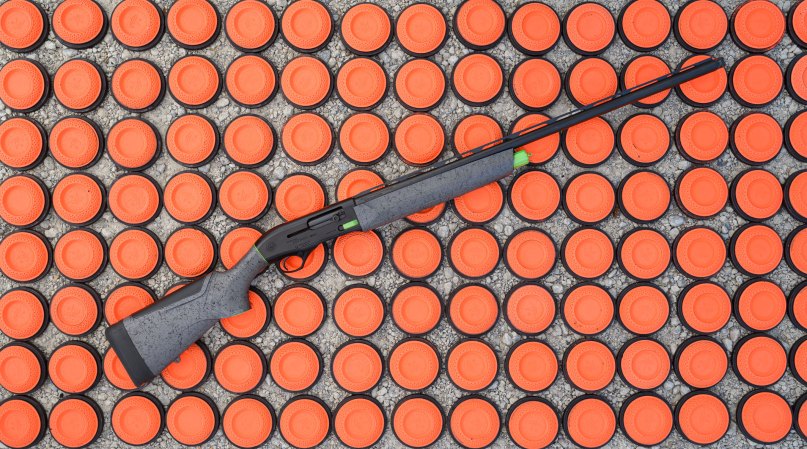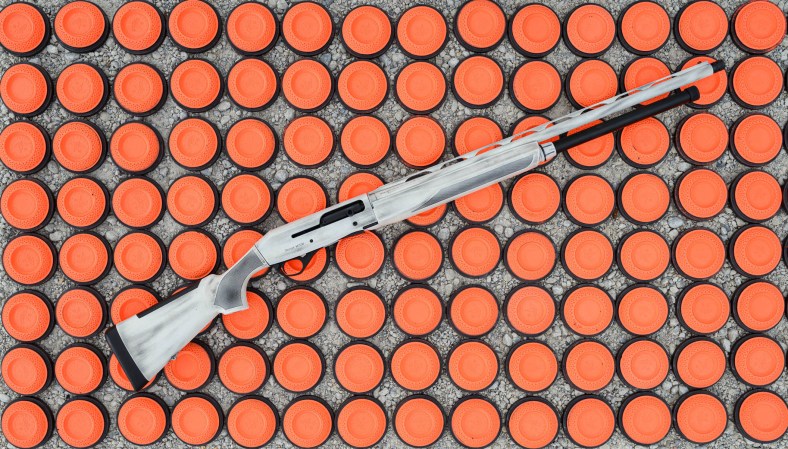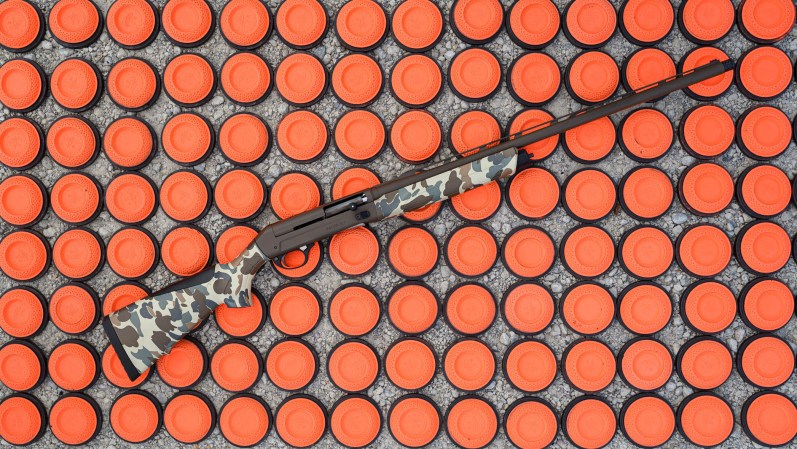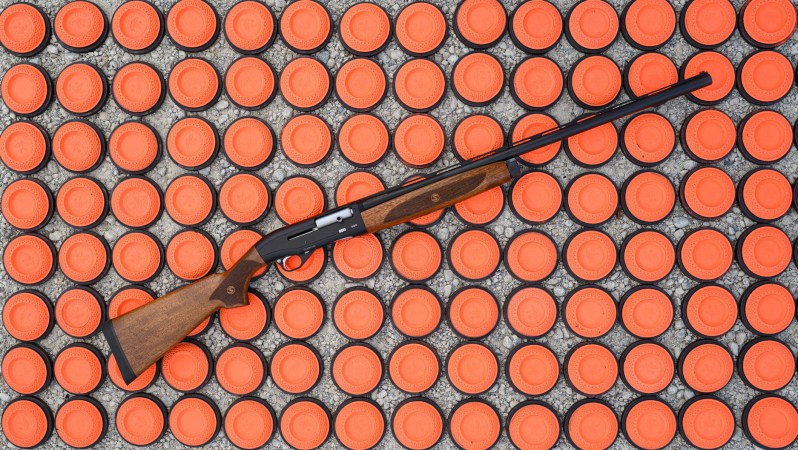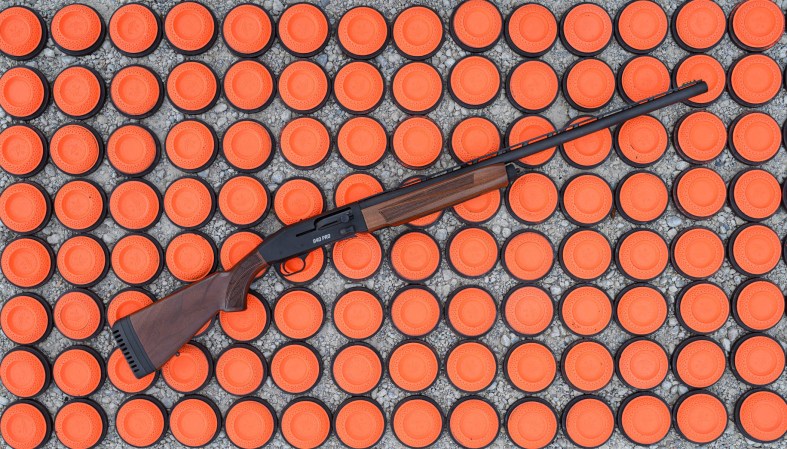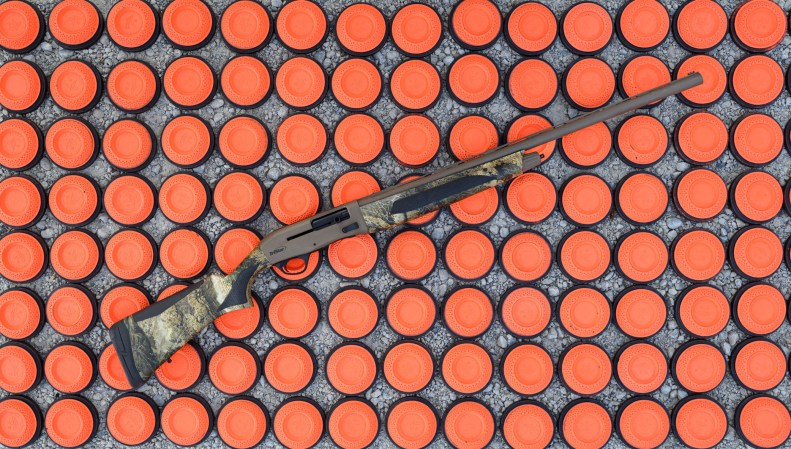We may earn revenue from the products available on this page and participate in affiliate programs. Learn More ›
My uncle quit working as a maritime engineer in his early 40s after squirreling away a small nest egg. He’s frugal to a fault and has been able to stay retired for several decades due to a simple philosophy. To him, every dollar saved is a soldier protecting him from the workforce and he parts with them under only the most reluctant circumstances. I don’t know that he’s craving a new shotgun—the vintage Belgium-made Auto 5 he inherited from his father still works just fine—but it wouldn’t shock me if he were tempted by some of the new smoothbores, many of which are tremendous bargains.
We assembled a large field of these shotguns to test, which we did over the course of an intense week of trigger pulling at the Minnesota Horse and Hunt Club in Prior Lake, Minnesota, and came away impressed by the excellent values there are to be had. While we awarded a justly-deserved Editor’s Choice to the best shotgun—the Benelli Super Black Eagle 3 in 28-gauge—we also bestowed a record number of prestigious Great Buy awards, which is good news for penny-pinchers like my uncle.
- Best Shotgun Overall: Benelli SBE 3 28 gauge
- Great Buy, Semiauto: Retay Gordion Extra Black
- Great Buy, Over-and-Under: Mossberg Gold Reserve Black
- Great Buy, Under $600: CZ 712 G3
- Great Buy, Waterfowl: Stoeger M3000
- Benelli Montefeltro
- Beretta Ultraleggero
- Beretta A400 Upland, 28 ga
- Beretta A300 Ultima Sporting
- Stoeger M3500 Snow Goose
- Sauer SL5 Waterfowl
- Stevens 560 Field
- Mossberg 940 Pro Field
- Tristar Viper G2 Pro
Turkish made guns are nothing new. The country has a storied history of firearms production dating to the 1400s when Sultan Bayezid the Just earned mad props for revamping his military’s field artillery and muskets, which he used to smack around Venetian mercenary forces, defeat an 80,000-strong Polish army, quell domestic rebellion (led by his ungrateful half-brother no less), and consolidate the holdings of the Ottoman Empire.
More recently, Turkish handguns, rifles, and shotguns have been imported to the U.S. as a less expensive option to European and domestically-produced sporting arms. Some are great values, others are just cheap. We saw examples of both in this year’s test, which also included a handful of pump-action shotguns, some of Turkish origin, which will be covered in another article. The trick for gunmakers has always been managing Turkish quality control, which can be spotty.
All told, we tested seven Turkish shotguns, more than from any other country by far. And all the Great Buy winners—the Retay Gordion, the Mossberg Reserve O/U, the Stoeger M3000, and CZ 712 G3—hailed from Turkey.
As a counterbalance to the value-priced Turkish guns, we also evaluated a number of high-end smoothbores that caught our fancy. Several Italian shotguns from Beretta and Benelli, not surprisingly, fared well.
How We Tested the Best Shotguns
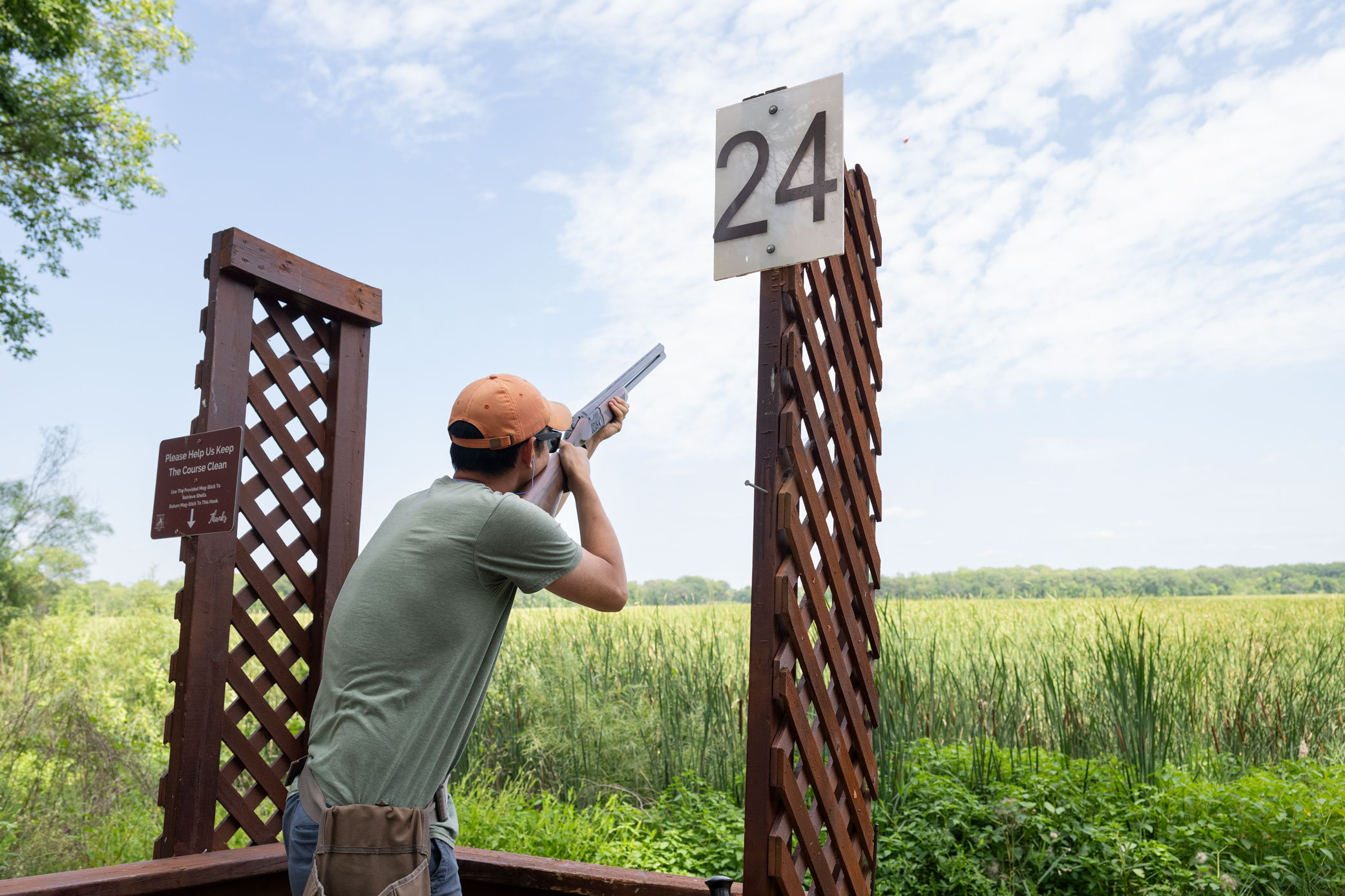
As with our roundups of the Best Rifles, Best Handguns, and Best 1911s, we convened a panel of judges consisting of Outdoor Life editors and impartial professionals to put the shotguns to the test. These days, new gun introductions happen all throughout the year. So for our test we selected the best shotguns that were introduced late in 2022 or in 2023.
This year’s team included Editor-in-Chief Alex Robinson, Executive Editor Natalie Krebs, photographer and waterfowler extraordinaire Bill Buckley, USA Shooting Olympic shotgun coach Hank Garvey, and yours truly.
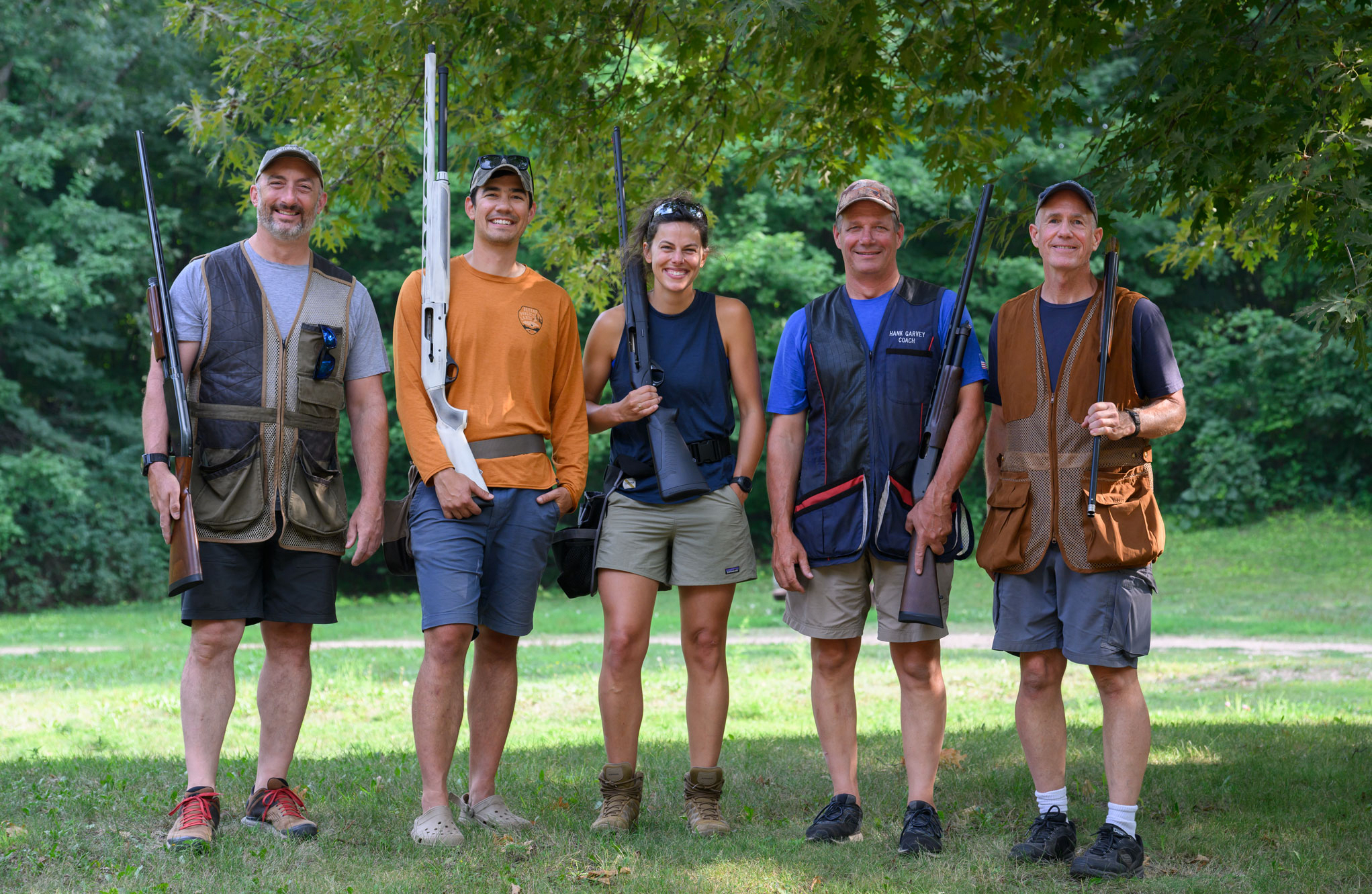
The first day at the range alone we pulled more than 2,000 targets at the Minnesota Horse and Hunt Club’s five stand setup and on many of their sporting clays stations. On the following days we lost count of targets flung—but suffice it to say we put enough shells through each gun to gain a thorough appreciation for their virtues and to expose shortcomings.
Shooting the Best Shotguns with a Purpose
We judge the guns on numerous criteria, detailed below, and do so by shooting them in a purposeful manner to get a feel for these qualities. That’s a fancy way of saying that we aren’t just trying to see how many targets we can break. Instead, we home in on specific qualities and arrive at our conclusions through a deliberate process.
Take felt recoil, for instance. We’ll load two shells in all the waterfowl guns and shoot them in rapid succession to see how they feel going head-to-head. Then, we repeat the process as many times as necessary to arrive at a solid judgment, which then helps inform our handling and ergonomics scores. We’ll do this without worrying about whether we hit a target.
We’ll conduct similar exercises when examining how well the controls function on a gun, how easy the guns are to load and unload, the quality of the fit and finish, the relationship between the grip and the trigger, and so on.
We also test the guns on their point of impact to see what kind of patterns they deliver and whether they are shooting true.
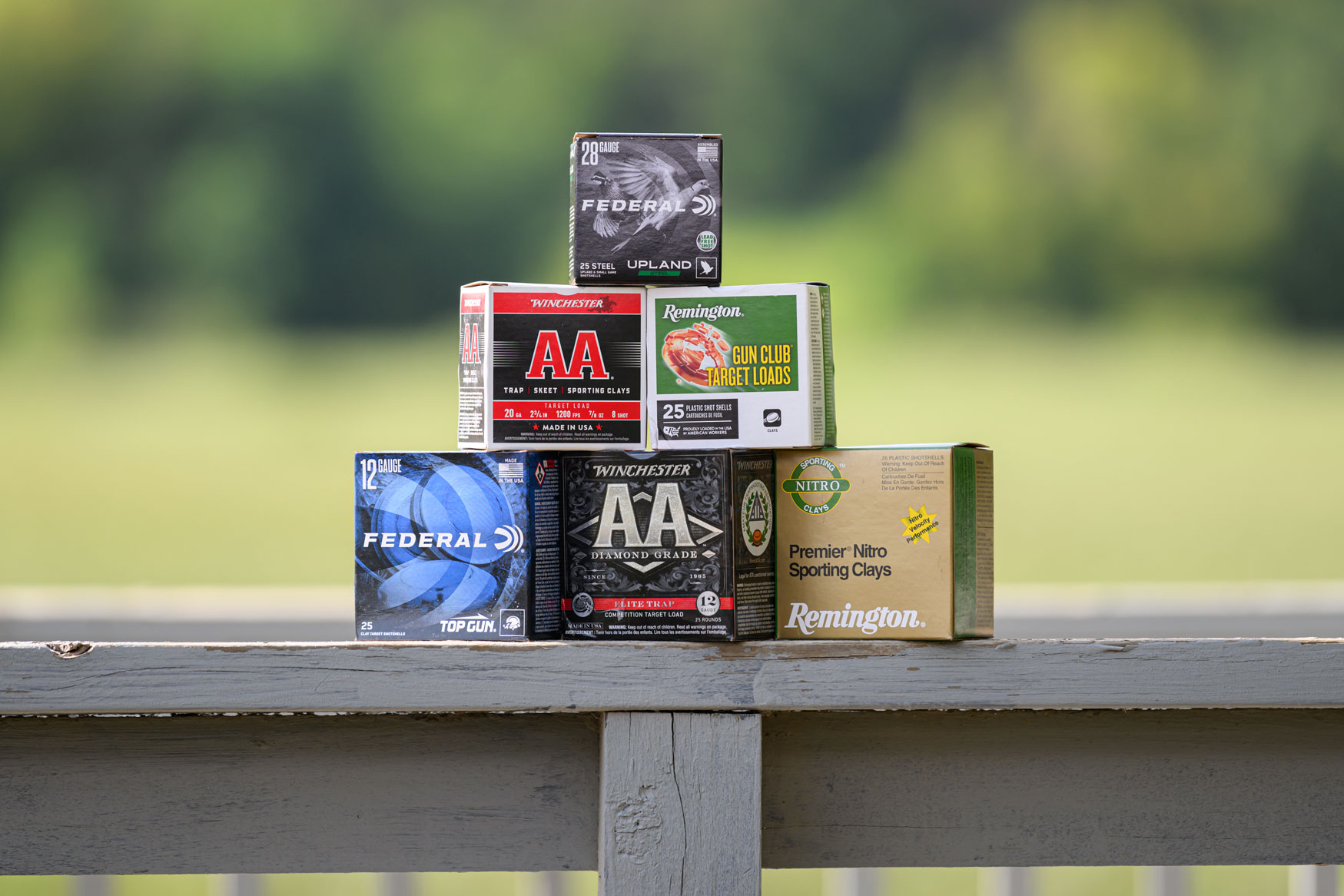
Panel Judging the Best Shotguns
Shooting guns in the context of their peer groups is much more illuminating than doing an individual review in a vacuum. Likewise having several judges independently testing and recording their impressions is superior to a review generated through the filter of just one person’s perspective. This mitigates the biases that a person might have toward a certain type of gun and produces more valid results.
How We Graded the Best Shotguns
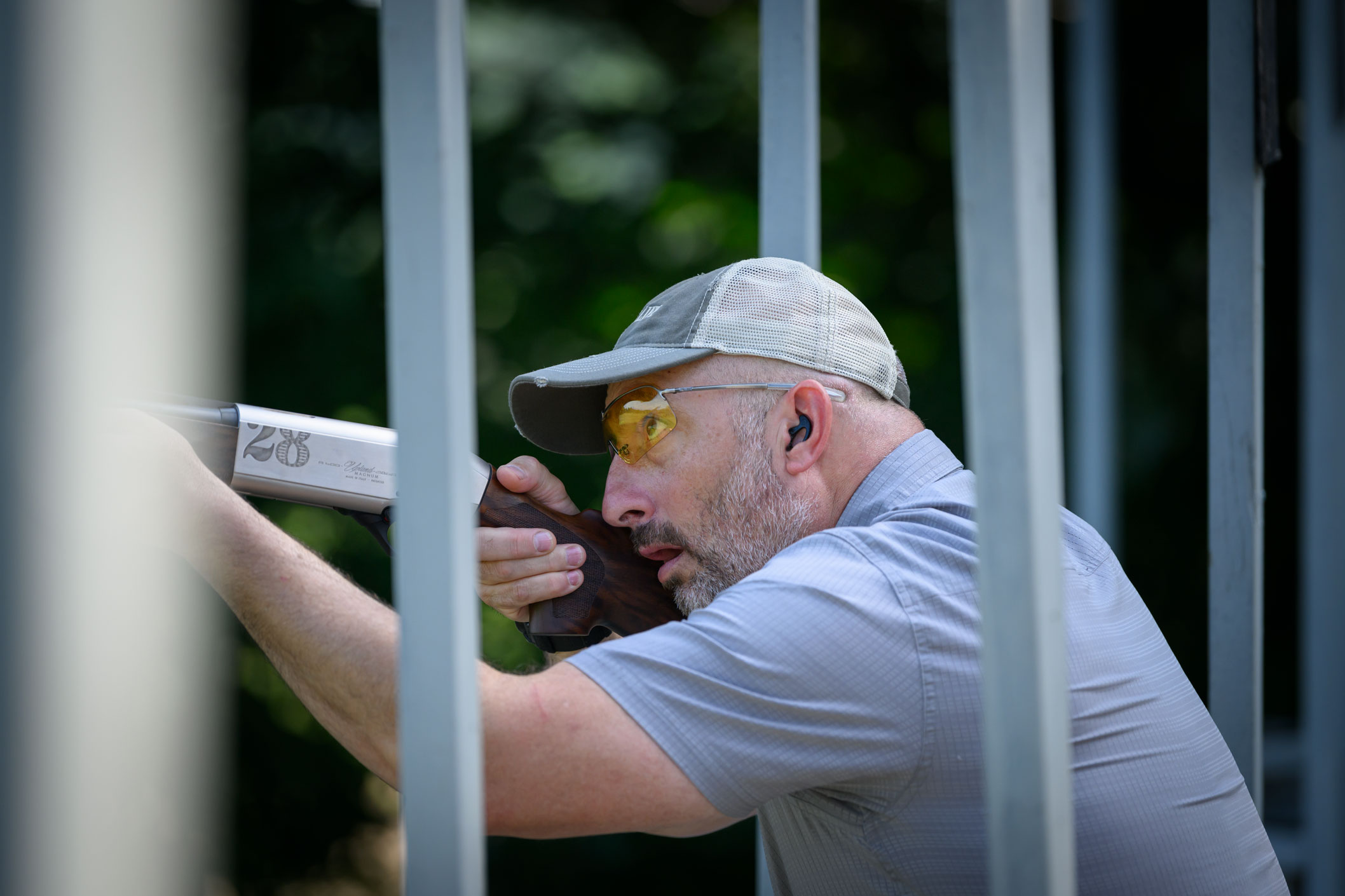
Each shotgun is evaluated on eight categories and given a score of 1 to 5 from each judge. We average these scores for each category and use their total to determine the ranking and awards. The categories are handling, workmanship, aesthetics, ergonomics, meets purpose, versatility, reliability, and value.
The scores then translate to the grades on the report cards for each firearm. Performance consists of the scores from handling, ergonomics, and reliability. Design includes workmanship, aesthetics, meeting its purpose, and versatility. Value stands on its own.
To earn an “Excellent” rating, the average of that score must be 4.5 or higher, a difficult mark to hit. “Very Good” is an average score of 3.5 to 4.5; “Good” is from 2.5 to 3.5; “Fair” is from 1.5 to 2.5; and “Poor” is under 1.5.
Best Shotguns: Reviews & Recommendations
Best Shotgun Overall: Benelli Super Black Eagle 3, 28-gauge
Report Card
- Performance: Very Good
- Design: Very Good
- Value: Good
Specs
- Action: Semiauto, inertia
- Stock: Synthetic
- Gauge: 28
- Chamber: 3-inch
- Capacity: 2+1
- Weight: 5.4 pounds (measured)
- Length: 47.5 inches
- Barrel: 26 inches
- Trigger: 4 pounds, 9 ounces (measured)
- Pattern: 100 percent at 13 yards
- Price: $1,899
While this Super Black Eagle 3 is a new gun—mostly thanks to its “magnum” 3-inch 28-gauge chamber—it is hardly a groundbreaking effort from Benelli. Light, handy sub-gauge semiautos that run like clockwork on inertia-driven actions are this Italian maker’s sweet spot. At this point, we’d be hard pressed to tally all the excellent guns Benelli has produced on this formula.
The whole test team raved about this gun. “Fun as hell to shoot.” “Its pointing ability is awesome.” “Very smooth…even on longer targets.” “A five-and-a-half-pound duck gun is amazing.”
That last comment is in the context of the 28’s 3-inch chamber, which is for a growing (if small) niche of waterfowlers who are using heavier-than-steel shot on ducks. Specifically, loads like Boss’s 1 1/16-ounce No. 4s, Hevi-Shot 1-ounce No. 6s, and Fiocchi 15/16-ounce No. 4 Bismuth—all of which are chambered in 3-inch hulls. (To be clear, even 3-inch 28s are not new for Benelli. They introduced their first back in 2016 in the Ethos.)
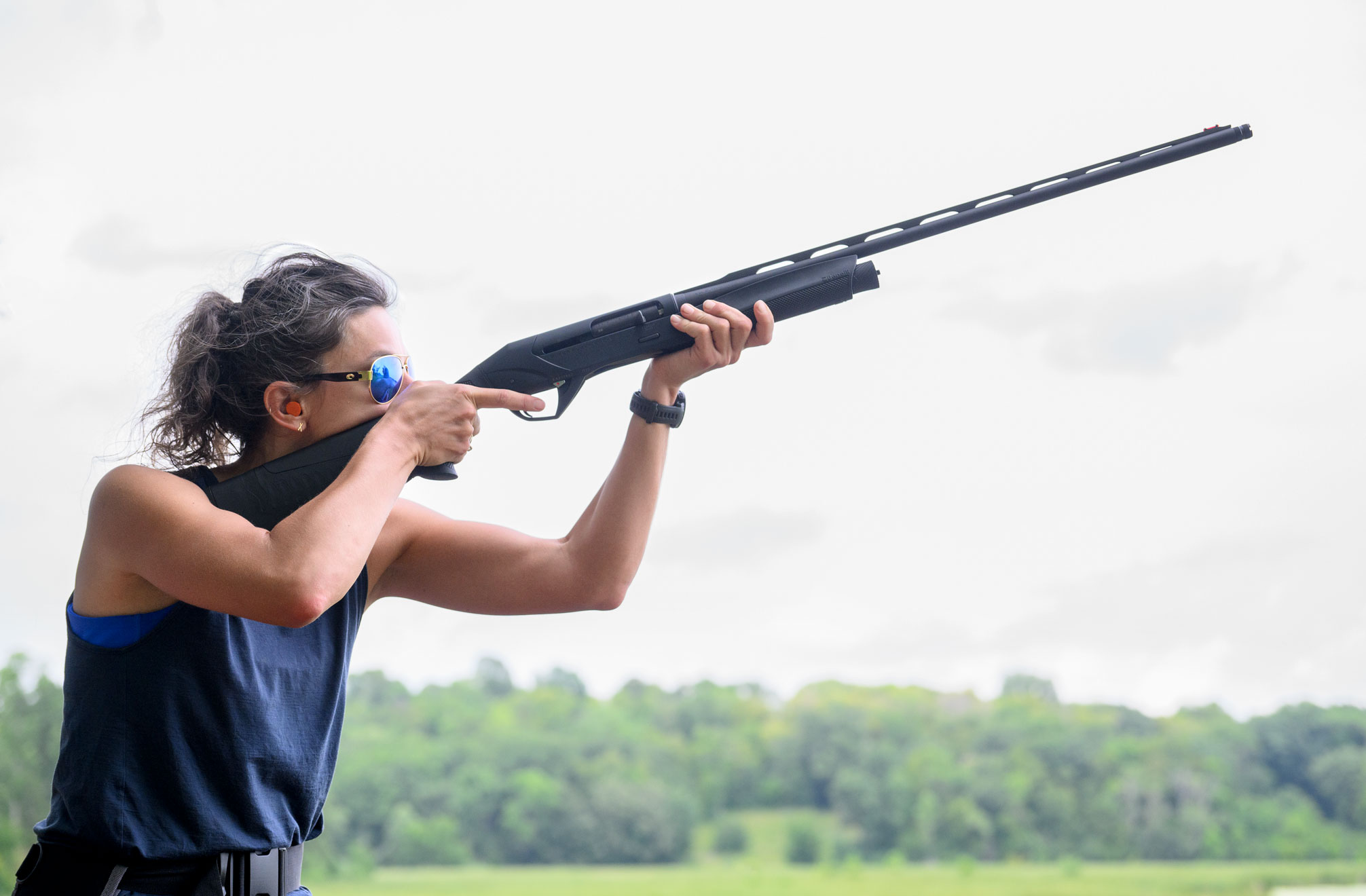
But whether you want to tote this SBE 3 in flooded timber, across prairie grasses that hold sharpies and huns, or just smash clays to smithereens without getting beat up, this little smoothbore will do the trick.
The deep curve of the grip looks good and purposeful and does a great job positioning the trigger hand in a more vertical position for better control over the butt and the trigger.
Felt recoil is next to nothing, and the chevrons on the stock help absorb what little kick the gun generates.
The bolt release tab is smooth, small, and positive—and if I could wave a wand I’d have every semiauto shotgun in the world incorporate something that felt and functioned as nice.
The SBE 3 turned in 100 percent patterns, meaning it placed all of its shot above the front bead at 13 yards, the distance at which we patterned all the of the best shotguns in this evaluation.
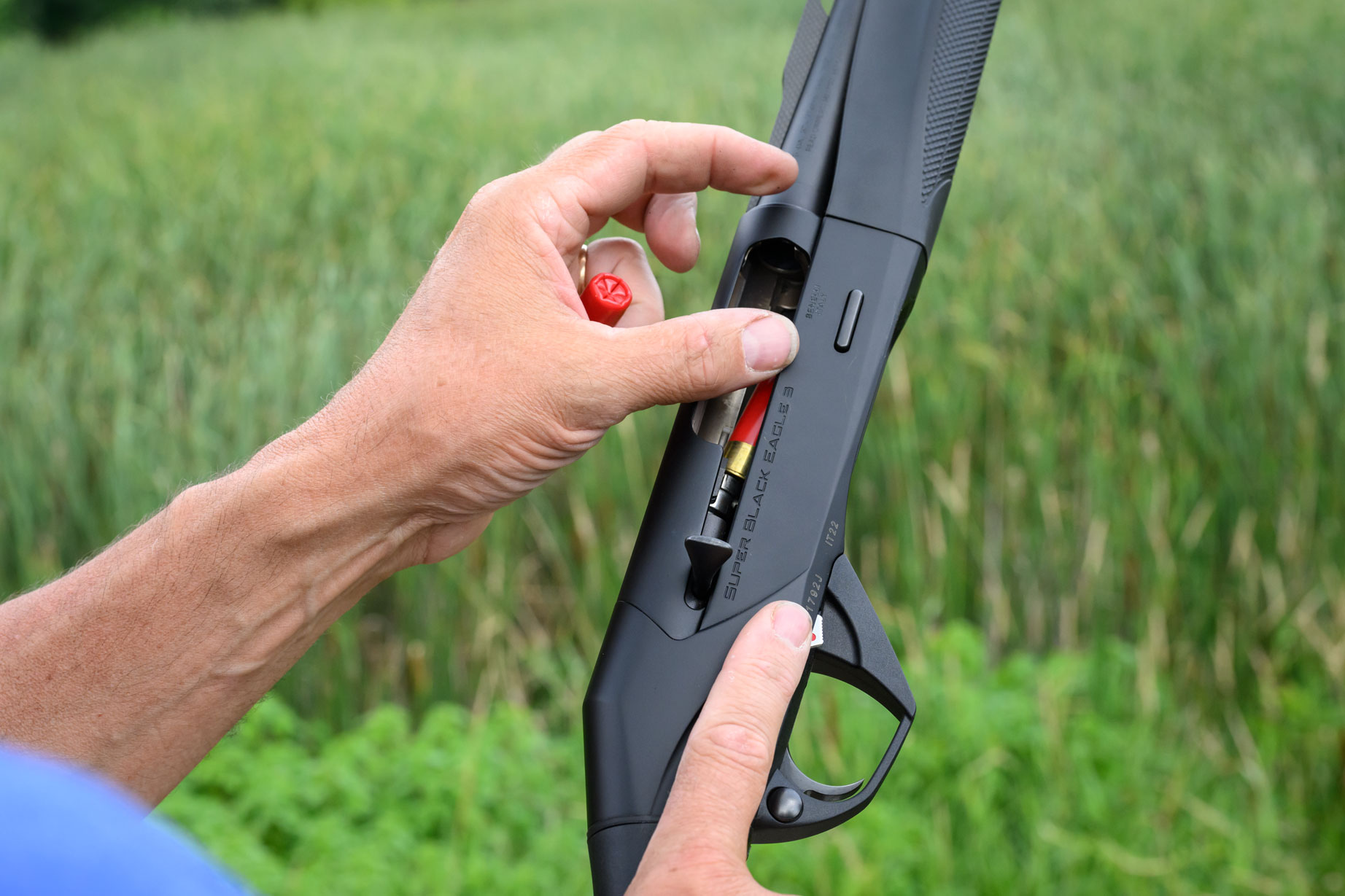
Being a critical and curmudgeonly crew, we did note that the safety was a bit stiff, the trigger pull was heavier than necessary, loading the gun required more effort than was ideal, and the geometry of the trigger guard, with its thick leading edge is distracting. But that didn’t stop us from awarding the shotgun scores that were high enough to elevate it above the rest of the field—earning it our Editor’s Choice as the overall best shotgun.
Great Buy, Semiauto: Retay Gordion Extra Black
Report Card
- Performance: Very Good
- Design: Good
- Value: Excellent
Specs
- Action: Semiauto, inertia
- Stock: Synthetic
- Gauge: 20
- Chamber: 3-inch
- Capacity: 4+1
- Weight: 6.29 pounds (measured)
- Length: 49.5 inches
- Barrel: 28 inches
- Trigger: 3 pounds, 10 ounces (measured)
- Pattern: 60/40
- Price: $899
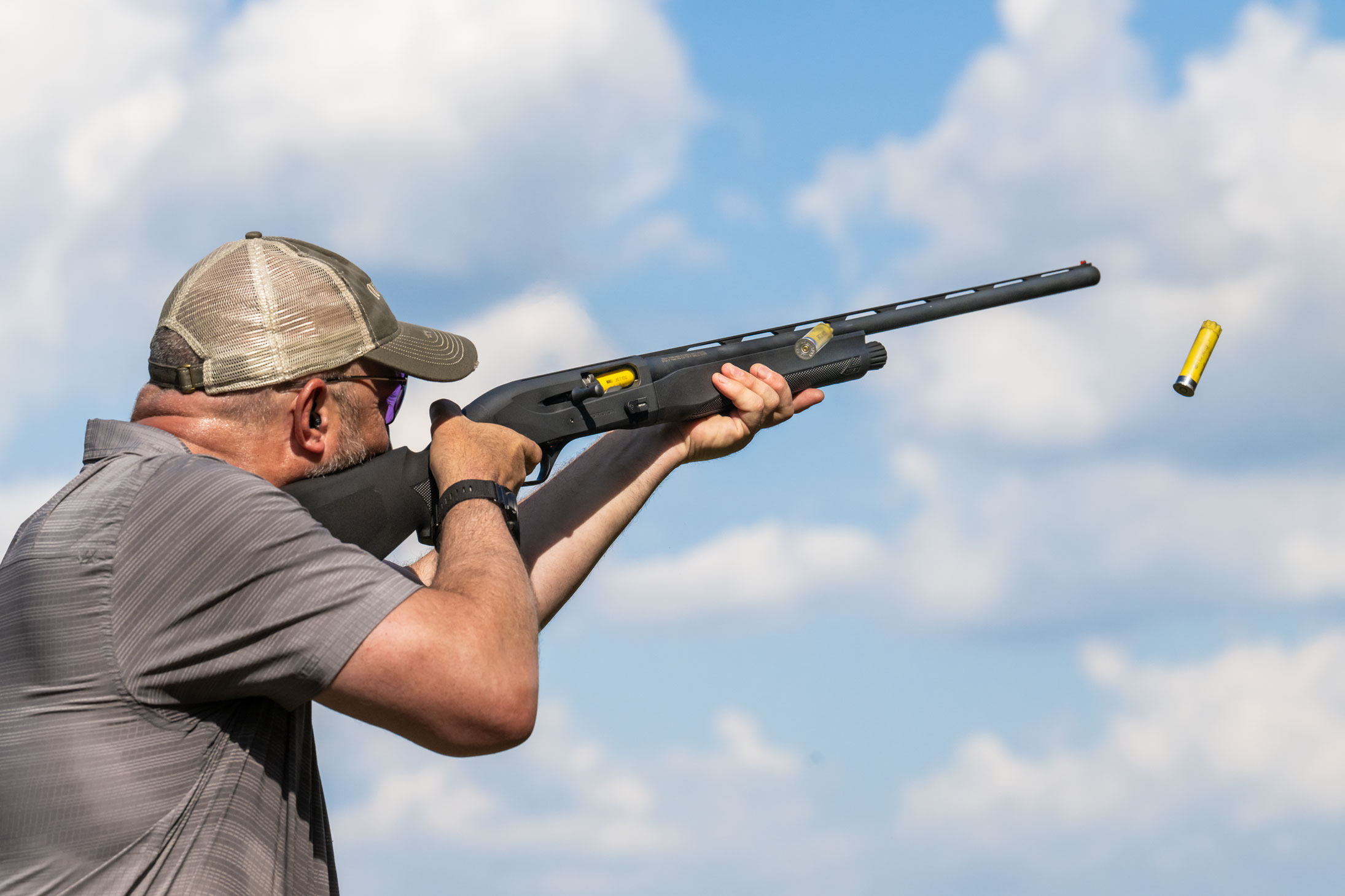
This Turkish-made Benelli knockoff is a hell of a value. We spent a lot of time comparing the Retay to the two Benelli semiautos in the test and have to confess that for a shotgunner on a budget it’s hard to find fault with this inertia-driven clone, which retails for less than $900.
It isn’t difficult to see where Retay saved money on the 20-gauge Gordion: It lacks Benelli’s level of workmanship and forgoes many of their ergonomic refinements and aesthetic flourishes. The oversized bolt release, the plain design of trigger guard, the quality of the finish on the metal—all these are elements where the Retay lags behind its Italian-made inspiration. But for an all-around shotgun for waterfowl, upland birds, and turkeys it is a solid choice. And whatever regret one might have for not owning the OG model is sure to be offset by the nearly $1,000 that was saved.
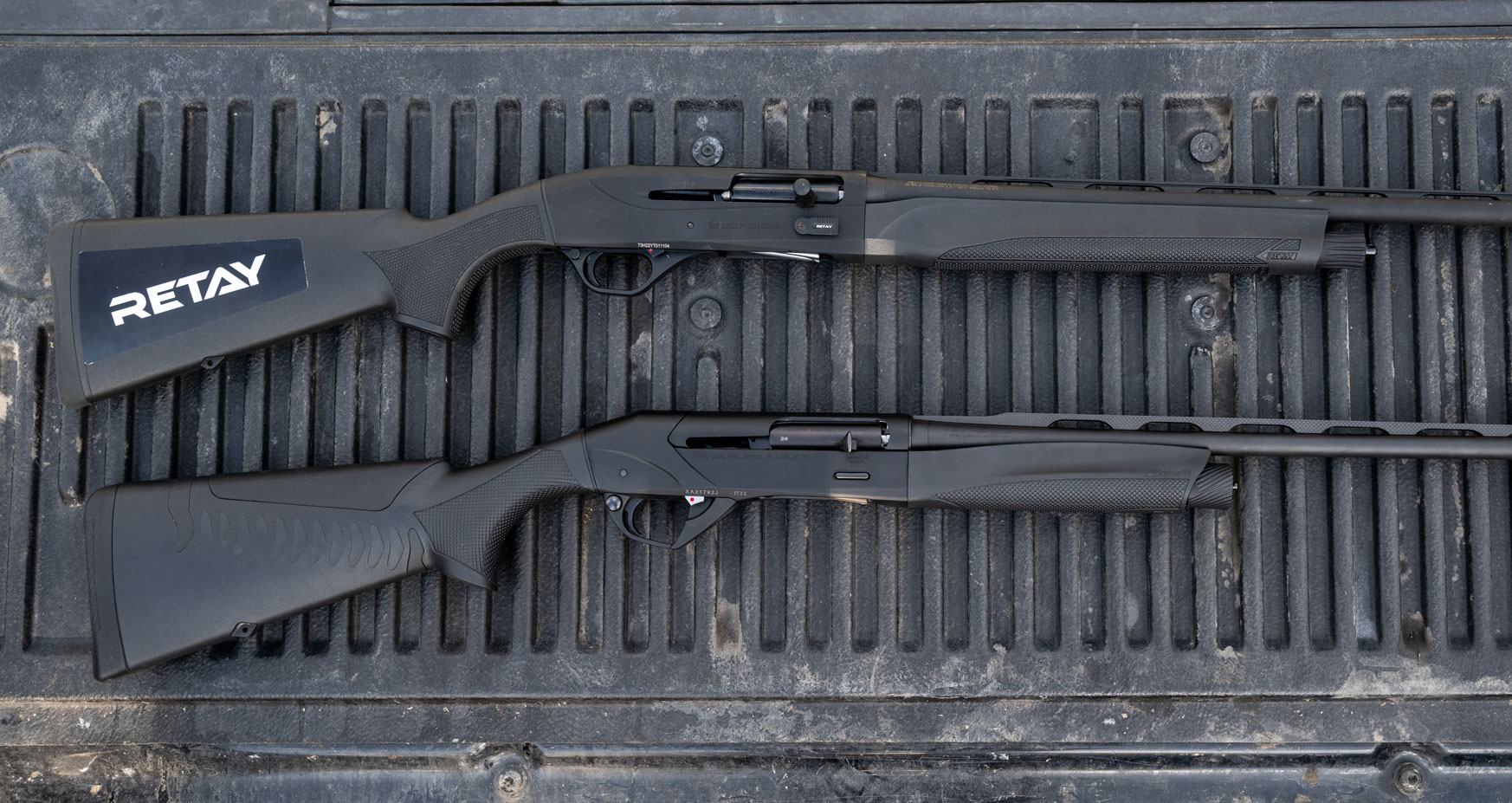
We all felt the Retay balanced well, and was a quick, snappy pointer, even with its 28-inch barrel. The very narrow fore-end was almost too slight for some testers, but others really liked the geometry and felt it augmented the Retay’s swift-handling manners.
We also liked the Gordion’s trigger, which broke at a touch above 3.5 pounds. All the basic functions of the gun—loading, unloading, safety manipulation, locking the bolt back—are accomplished in an intuitive manner.
To cement the Retay’s value it comes with five choke tubes and a shim kit to customize its fit. Lastly, it earned high marks for its reliability. We had no issues with it cycling any of the loads we tested and it ran like a champ when dirty.
Great Buy, Over-and-Under: Mossberg International Gold Reserve Black
Report Card
- Performance: Good
- Design: Good
- Value: Very Good
Specs
- Action: O/U
- Stock: Walnut
- Gauge: 20
- Chamber: 3 inches
- Capacity: 2
- Weight: 6.43 pounds (measured)
- Length: 47 inches
- Barrel: 30 inches
- Trigger: 7 pounds (measured)
- Pattern: 50/50
- Price: $1,135
This shotgun was the biggest surprise of the test. I wouldn’t describe the Outdoor Life shotgun team as a bunch of snobs—no one likes a sub-$500 pump gun more than we do—but when it comes to over-and-unders there is such a thing as standards.
Well, you could have slapped the monocles off our faces with a feather when we started shooting Mossberg’s International Gold Reserve Black. From the very first shells we dropped into this Turkish-made double we were impressed by how well it comported itself.
With its 30-inch barrels, the Gold Reserve Black has a buttery smooth swing. The balance point on the gun is a couple inches in front of the hinge pin, making it slightly muzzle-heavy, but we didn’t mind that one bit. The barrels tracked even and true on long crossers, yet the gun never felt sluggish on fast targets up close.
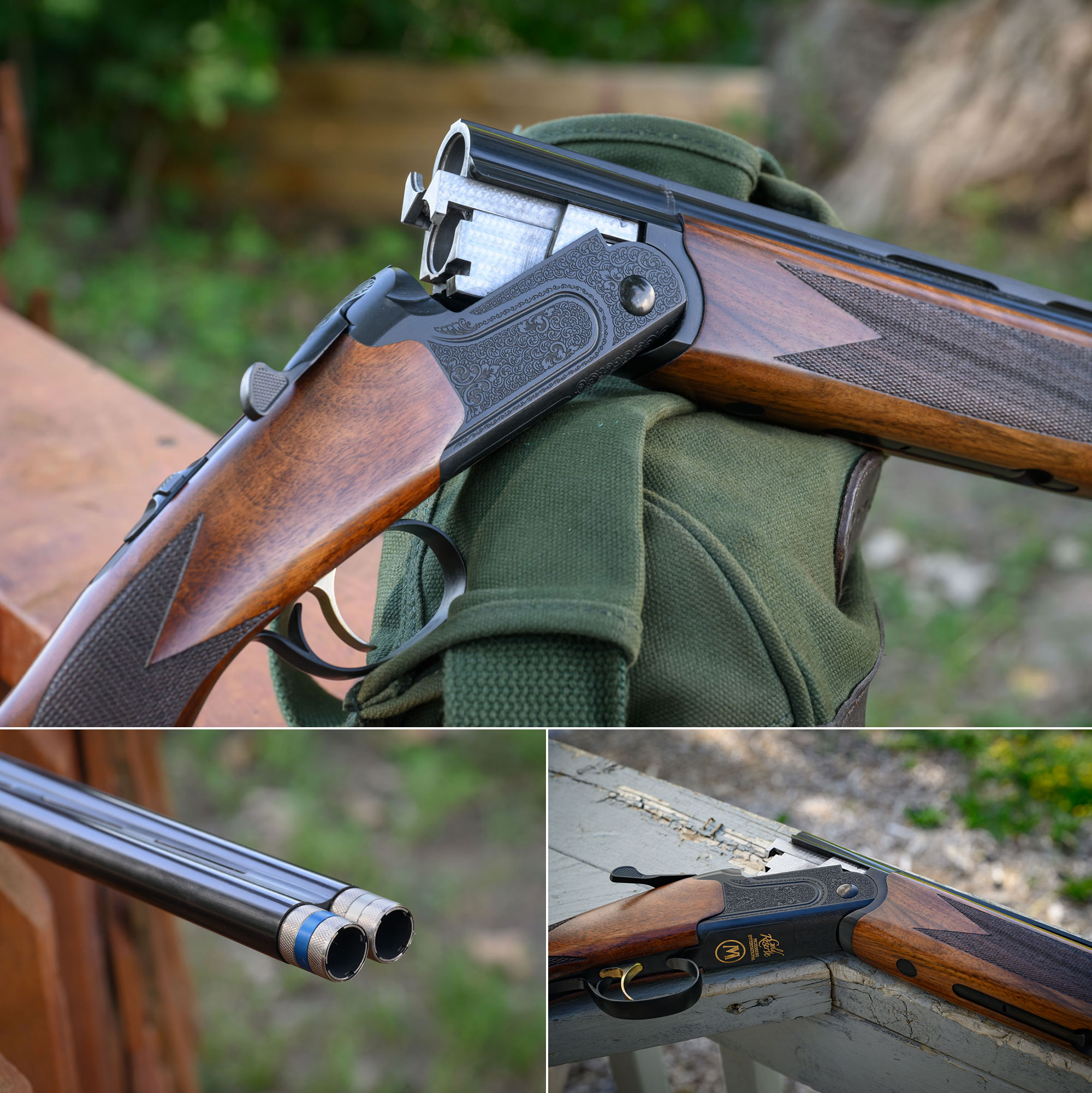
Its even 50/50 pattern helped the gun navigate every target presentation we challenged it with. It’s an instinctive shooter—one of those guns were you just get it on target, break the trigger, and watch the shards fly.
The shotgun comes with a Schnabel fore-end that’s comfortable and well-shaped, and like the rest of the stock is fashioned from walnut that is surprisingly handsome for the price.
The engraving on the receiver, which is scrollwork done on polished black metal, is also attractive. The overall aesthetics of the shotgun are impressive for $1,135.
That’s not to say the gun doesn’t have its drawbacks. The recoil pad is undersized, hard, and not very effective. This shotgun bites harder than it should.
It comes with a mechanical trigger, which is nice, but its long, heavy pull is distracting. (It’s never a great sign with the trigger weight on a shotgun exceeds the weight of the gun itself.) The barrel selector is mushy—when toggling from one barrel to the other the switch doesn’t click into place in a positive fashion. And when the selector ends up somewhere in the middle, the safety won’t disengage.
It’s nice that Mossberg ships the shotgun with five extended choke tubes, but the chrome finish on them doesn’t go well with the nicely done black finish on the barrels. Solid black tubes would make the gun look much more elegant.
But, when you’re in this price range for an over-and-under you’re going to have to live with some compromises. The fact that the gold finish on the lettering on the bottom of the receiver started to wear off after just a couple days needs to be balanced by the recognition that the barrels on the gun are well struck and relatively ripple free, the ejectors are crisp and strong, and that the vented side ribs are nicely executed.
Ultimately, this shotgun is a screaming deal for someone who wants to get into a good O/U for a good price. Personally, if I were to get one, I’d upgrade the recoil pad, replace the chokes, and never look back.
Great Buy, Under $600: CZ 712 G3
Report Card
- Performance: Good
- Design: Good
- Value: Excellent
Specs
- Action: Semiautomatic, gas piston
- Stock: Walnut
- Gauge: 12
- Chamber: 3 inches
- Capacity: 3+1
- Weight: 7.35 pounds (measured)
- Length: 47 inches
- Barrel: 26 inches
- Trigger: 3 pounds, 12 ounces (measured)
- Pattern: 50/50 with POI 8 inches right at 13 yards
- Price: $579
Our experience with this shotgun was a bit of a mixed bag, making it tough to judge. But ultimately, we agreed with Bill Buckley’s assessment that we’d feel comfortable recommending it to a friend in need of an inexpensive and versatile 12 gauge. That quality is what earned it a Great Buy award.
Let’s start with the highlights.
First, there’s the cost. “I mean, less than $600 for a semiautomatic bird gun,” Editor in Chief Alex Robinson, a diehard duck hunter, said more than once. And he’s right. There aren’t a lot of options at that price that aren’t junk.
But a great value is great only if it delivers reliable performance, which for the most part the CZ 712 G3 did.
It comes with two pistons, one for light target loads and the other for heavier hunting loads. You can switch from one to the other by removing the fore-end and pulling the barrel free to expose the gas system. Normally, that’s a simple procedure, but the CZ requires an extra step to break down. After removing the fore-end, it has a nut on the magazine tube that needs to be loosened in order to field strip the gun.
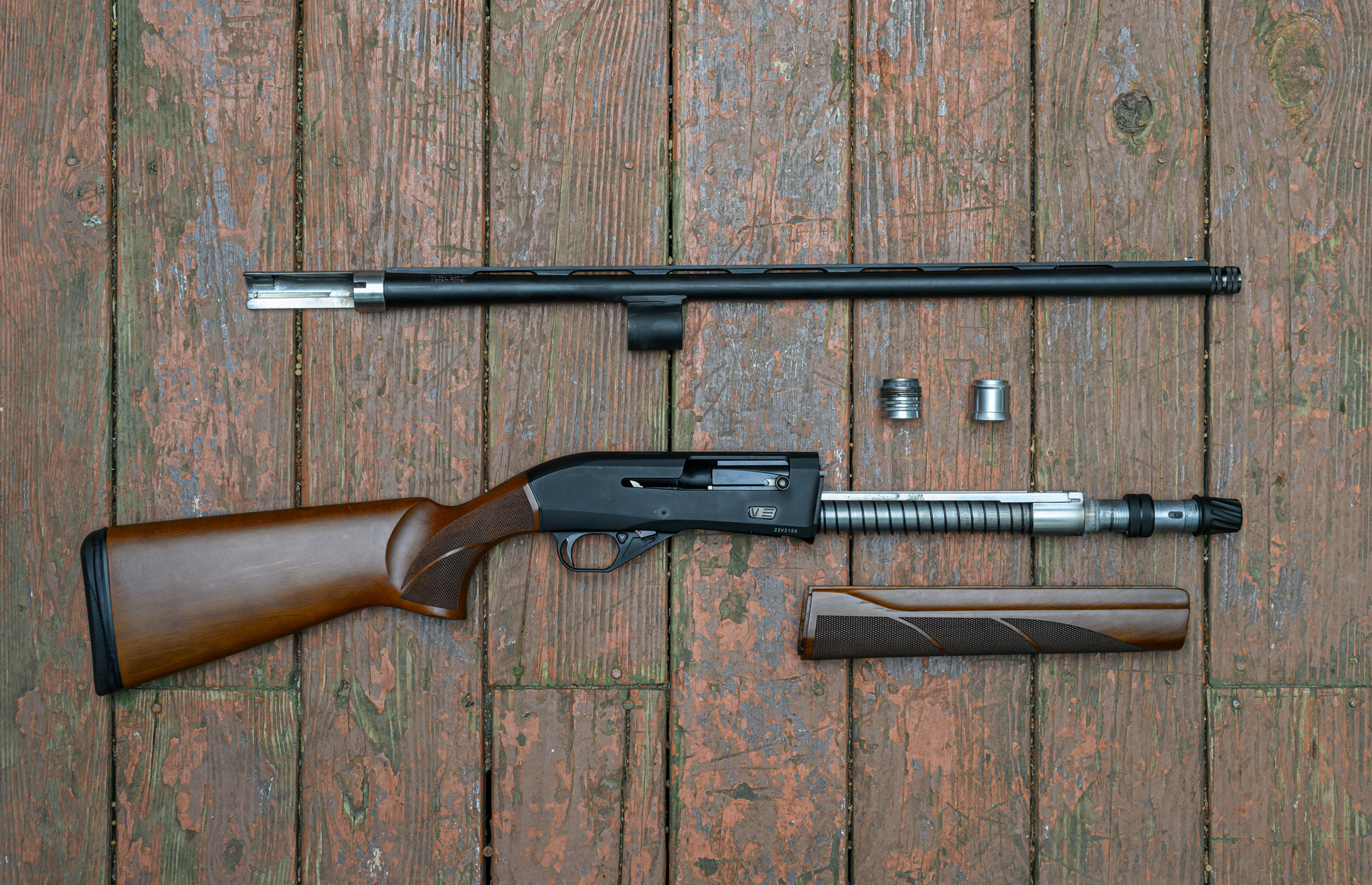
For the bulk of the test, we shot ours with the piston for target loads on board. Once the gun got dirty it had issues cycling Remington’s Gun Club target load, but a wipe down with a rag and some gun lube dealt with that. It digested everything else without any issues, including heavier game loads with the other piston installed.
In addition to earning high scores for its value, the CZ 712 G3 got solid marks for its versatility as an all-around hunting gun. Assuming a hunter doesn’t object to its 7.35-pound weight, it’ll be as capable for walking up pheasants as it will in a duck blind.
In terms of how it handled the CZ 712 G3 does a good job managing recoil, but it is not quick or lively. It is a bulky gun with a blocky fore-end and felt heavy in our hands. Though the texture on the fore-end and grip gives the shooter a solid purchase, it’s much more of a 1980s vintage F-150 than a modern sport SUV. It’ll get the job done, but it isn’t an elegant ride.
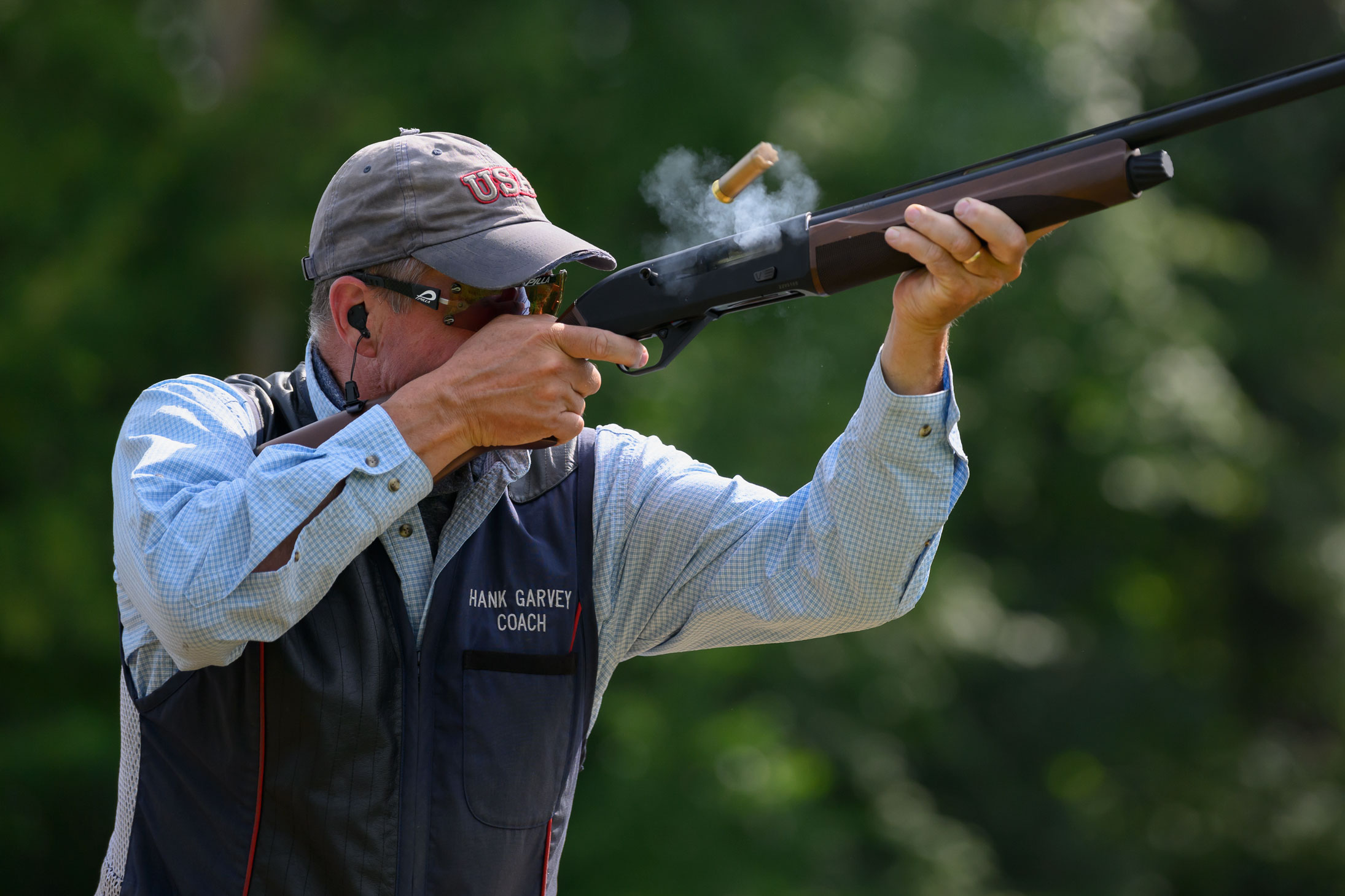
We broke plenty of clays with it but when we took it to the patterning board we found that it shot to the right. We repeated the test with two different loads—Federal 1-ounce Top Gun and Winchester AA Diamond Grade 1 1/8-ounce No. 7 ½—and had the same result, which was a pattern that impacted about 8 inches off center at 13 yards.
That’s not a fatal flaw, and other samples might shoot to point of aim, but it demonstrates why one should pattern a shotgun before taking it afield.
The gun does come with a shim kit that should help dial it in and five choke tubes as well.
In the end, the CZ 712 G3 isn’t perfect, but it is such a good value that its flaws are not difficult to live with.
Great Buy, Waterfowl: Stoeger M3000
Report Card
- Performance: Good
- Design: Good
- Value: Very Good
Specs
- Action: Semiauto, inertia
- Stock: Synthetic camo
- Gauge: 12
- Chamber: 3 inches
- Capacity: 4+1
- Weight: 7.08 pounds (measured)
- Length: 47.75 inches
- Barrel: 26 inches
- Trigger: 4 pounds, 6 ounces (measured)
- Pattern: 70/30
- Price: $619
The Stoeger M3000 earned its Great Buy award following the same formula as the CZ 712 G3. It isn’t perfect but its attainable price makes up for the invariable shortcomings associated with building such an inexpensive gun.
The M3000 we tested, dipped in Mossy Oak Bottomland camo, is designed with waterfowling in mind. It runs on an inertia-driven action, similar to that used by its sister company Benelli. Some M3000s we’ve shot in the past have had issues feeding and cycling, and we’re happy to report that we encountered no such problems with this gun. We gave it high marks in that category.
Like other inertia guns it kicks fairly hard, though Stoeger did equip it with a large, cushy recoil pad to help. Though as one tester noted, the M3000 isn’t meant for high-volume shooting and with a hunting jacket on (and greenheads cupped on final approach) the stiff recoil becomes a non-issue.
While it isn’t a lightweight, the M3000 points like a much more expensive gun, which we appreciated. Its camo isn’t going to win any beauty contests but the quality of the finish was very good. We didn’t get a chance to subject it to a week of hunting in a salt marsh, but it left us with the impression that it would deliver many seasons of reliable service.
That said, the pounding we did put it through revealed a couple chinks in the armor. At some point on day two or three the bolt-release tab came loose, so that’s something a prospective buyer should keep an eye on. We also noticed that the triangular safety tab, located on the rear of the trigger guard, spun freely.
The furnishings on the gun are basic. It has a large red plastic front bead (too large, according to our editor in chief), adequate checkering on the fore-end, and a receiver that’s tapped for mounting a scope.
It comes with a basic shim kit and three chokes, and is a versatile shotgun and an ideal choice for someone whose primary focus is waterfowl but wants a gun that can work for upland birds, turkeys, and deer.
Benelli Montefeltro
Report Card
- Performance: Very Good
- Design: Very Good
- Value: Very Good
Specs
- Action: Semiauto, inertia
- Stock: Walnut
- Gauge: 12
- Chamber: 3 inches
- Capacity: 4+1
- Weight: 6.63 pounds (measured)
- Length: 46.25 inches
- Barrel: 26 inches
- Trigger: 3 pounds, 8 ounces (measured)
- Pattern: 70/30
- Price: $1,499
There are two types of shotgunners in the world. Those who will correctly pronounce “Montefeltro” with a knowing look in their eye when you ask what kind of gun they’re shooting; and those who will just say “a Benelli” because they don’t want to seem like an insufferable prig.
No matter which camp one falls into, however, they’ll agree that this handy and well-balanced 12-gauge is a fine shooter.
At a skoosh over 6.5 pounds the Montefeltro hits a sweet spot for bird hunting. It’s light enough for all-day carry, and because it is a 12-gauge, it can deliver plenty of firepower for the toughest late-season pheasants. Usually this combination would necessitate stout felt recoil, but the design of the Montefeltro’s stock does an excellent job mitigating kick (though after running it through a full round of 100 sporting clays you’re going to feel it).
None of the best shotguns at this price point (or above) earned as high a rating in the value category, which is a strong indication of how much we liked it. It’s also worth noting that its overall score (which is used to pick our Editor’s Choice) was second only to the Super Black Eagle 3. So even though the Montefeltro didn’t earn an award, it is without question one of the best shotguns.
At just under $1,500 it is a refined semiauto that’s blessed with good looks, performs like a champ, and exhibits top-notch workmanship throughout.
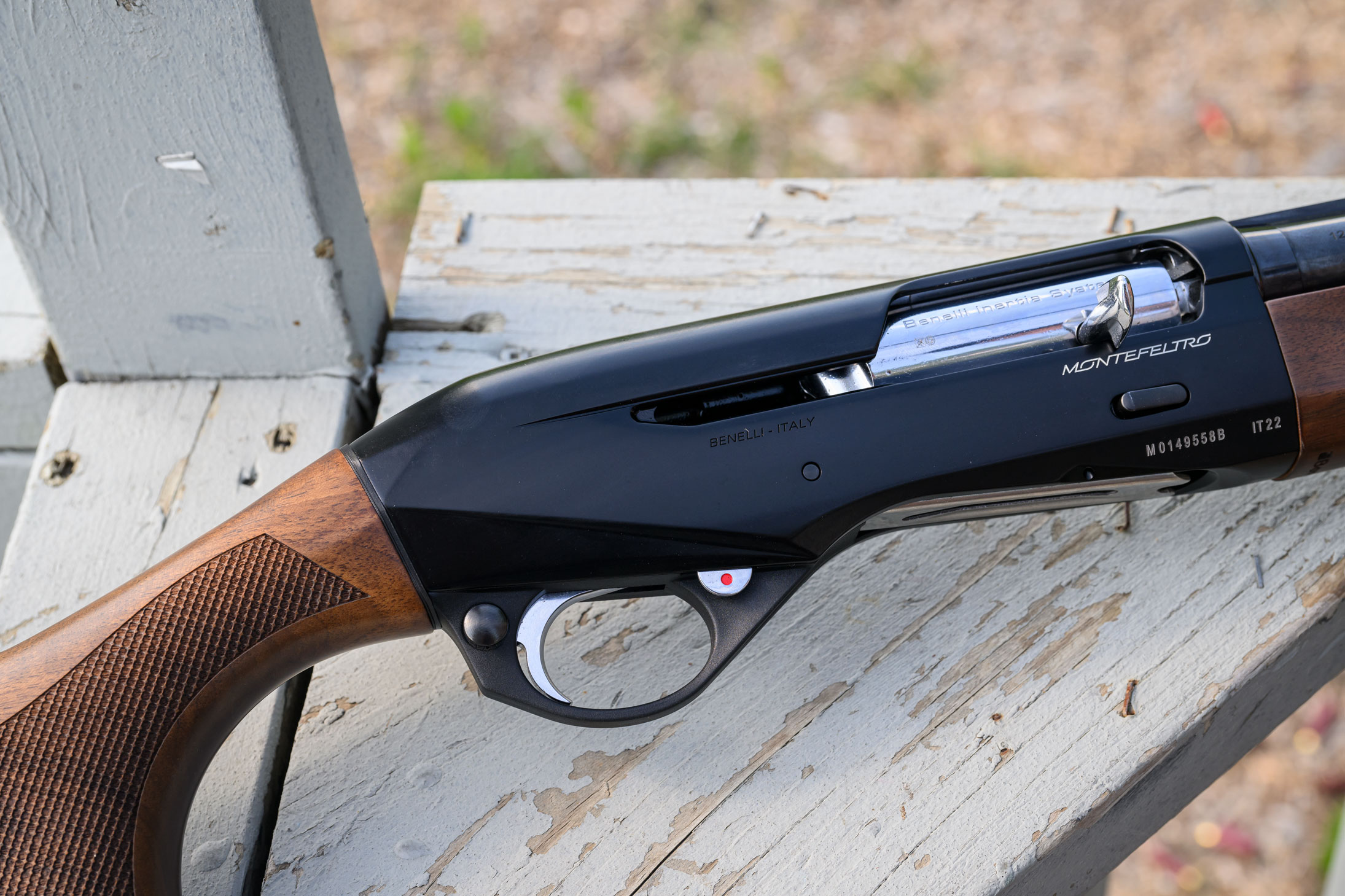
The trigger guard is elegantly curved, has plenty of room to accommodate a finger in a glove, and incorporates a groove to help guide shells into the loading port. The loading port is undercut for easier access, borrowing an idea from multi-gun and tactical competition, but does it in a way that is elegant and very Italian. The cut also makes an ideal spot for one-handed carry.
The fore-end and grip dedicate lots of real estate to the laser cut checkering for a solid handhold. The finish on the barrel and receiver is rich and attractive, and the chrome bolt completes the gun’s pleasing aesthetic.
Its length of pull is short enough to work with heavy clothing during late season hunts. The trigger, as is typical on Benelli semis, is spongy but reasonably light. If your budget accommodates a gun at this price, and you’re in need of a workhorse bird gun that’s easy on the eyes, the Montefeltro won’t disappoint.
Beretta Ultraleggero
Report Card
- Performance: Very Good
- Design: Very Good
- Value: Good
Specs
- Action: Over-and-under, boxlock
- Stock: Walnut
- Gauge: 12
- Chamber: 3 inches
- Capacity: 2
- Weight: 6.4 pounds
- Length: 45.75 inches (measured)
- Barrel: 28 inches
- Trigger: 3 pounds, 9 ounces (measured)
- Pattern: 50/50
- Price: $2,999
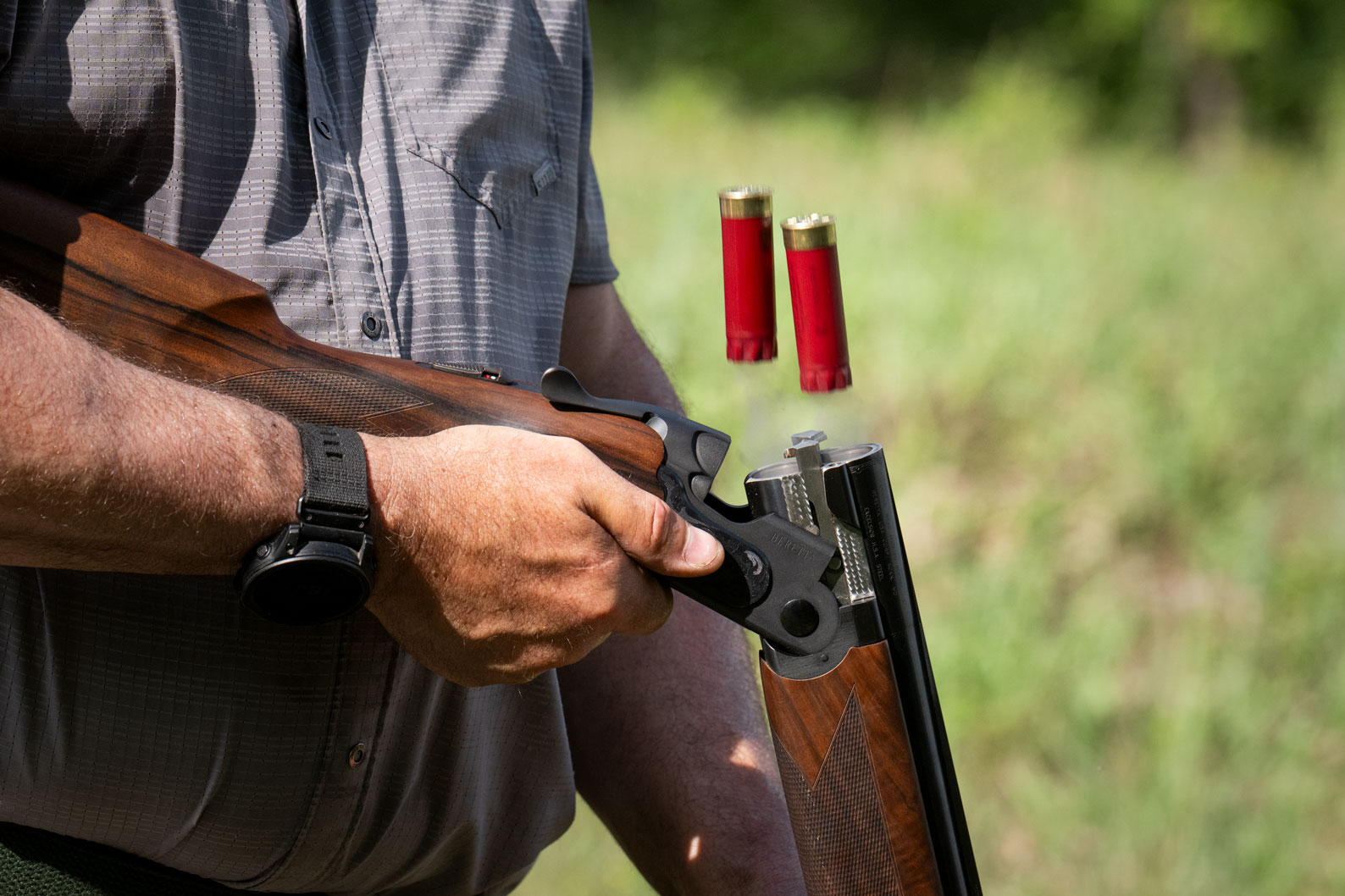
Ultraleggero means “ultralight” in Italian, and Beretta went to great lengths to make this 12-gauge O/U live up to the promise. From a technical standpoint it is one of the most fascinating shotguns in recent memory. From a practical standpoint it is an ideal lightweight walking upland gun. And from an aesthetic standpoint it is the prettiest gun in the test.
And at just under three grand it was also the most expensive gun in this year’s field. That, combined with its niche purpose, means it isn’t for everyone.
But what it’s designed to do, it does very well. Removing a meaningful amount of weight from a shotgun is a tricky proposition. If it isn’t executed with a deft touch you’ll end up with something that is whippy, unresponsive, unpleasant to shoot, and unreliable.
Thankfully, Beretta has been at this for a while—the company is coming up on its 500th anniversary in 2026—so they’re comfortable navigating this terrain.
They built the Ultraleggero on a modified version of their 690 action—one that has been skeletonized and uses plastic inserts to cut weight without compromising strength. Beretta’s engineers applied this formula to the rest of the gun, removing a significant amount of wood from the butt and fore-end, using a thin recoil pad, and joining the barrels without employing side ribs. It is as stripped down and purposeful as an F1 car.
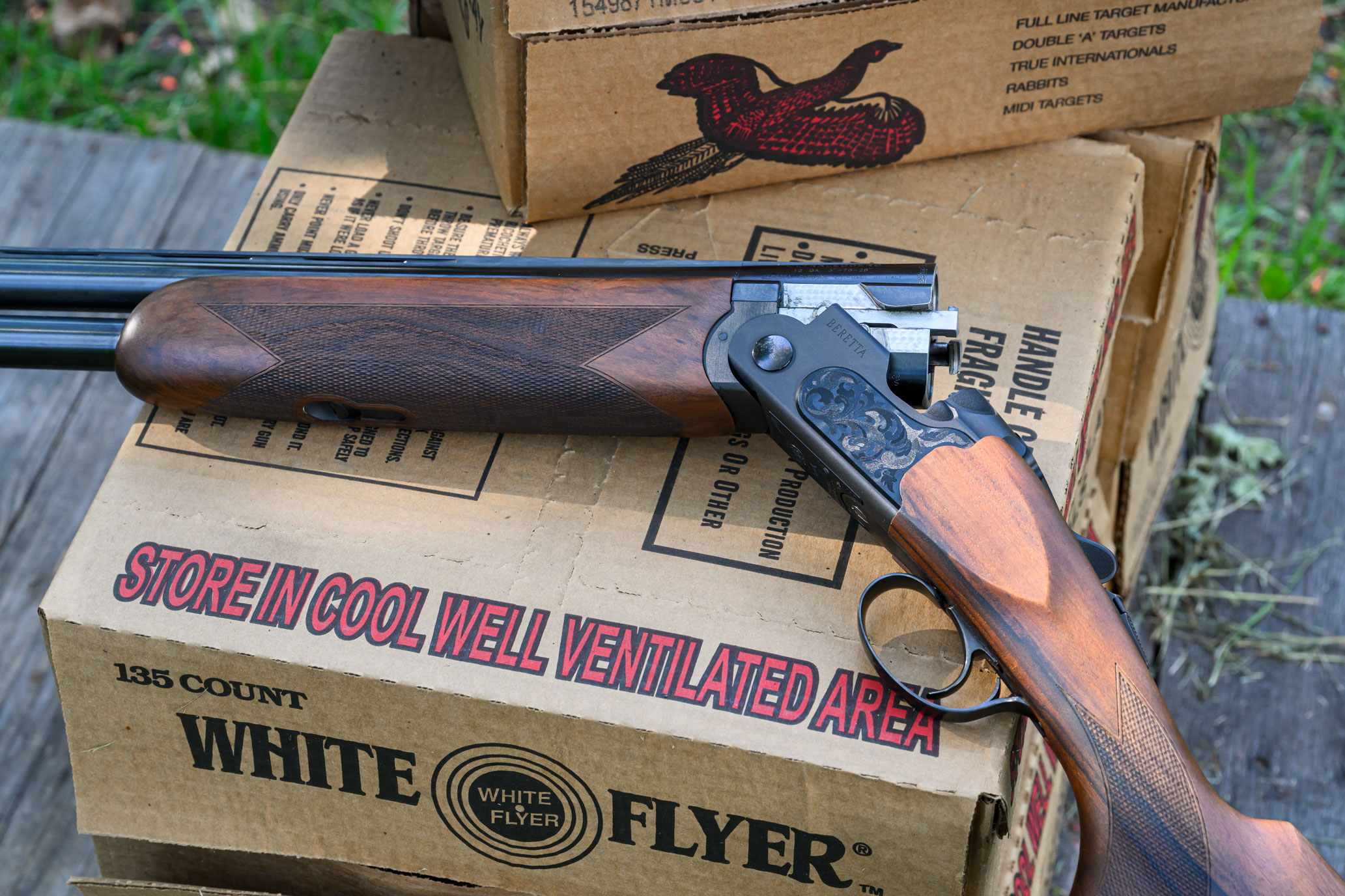
We all liked how the gun balances and handles, though we rightly noted that its light weight comes at the cost of felt recoil. When it comes to Newtonian physics, you can’t have your cake and eat it too. With field loads, the Ultraleggero packs a wallop. “I would not want to shoot a regular diet of sporting clays with it,” one judge remarked dryly.
The gun’s workmanship is outstanding. The barrels are beautifully struck and free of ripples. The engraving on the plastic inserts on the action and around the metal fences is understated and elegant. (Plastic inserts with elegant engraving is a combination of words I never imagined myself writing.) The gun’s controls, with the exception of the automatic field safety, which is a bit gritty and stiff, are very good.
I think most people who appreciate fine shotguns will be taken with the Ultraleggero’s dark wood and pleasing lines, but whether this Italian beauty merits a spot in your gun safe really comes down to the type of hunting you do. If you like walking long miles with an easy-to-carry and capable 12-gauge, the answer might be yes.
Beretta A400 Upland “Magnum”
Report Card
- Performance: Very Good
- Design: Very Good
- Value: Good
Specs
- Action: Semiauto, gas
- Stock: Walnut
- Gauge: 28
- Chamber: 3 inches
- Capacity: 2+1
- Weight: 5.88 pounds (measured)
- Length: 48.5 inches
- Barrel: 28 inches
- Trigger: 3 pounds (measured)
- Pattern: 60/40
- Price: $1,829
This 28-gauge semi is a blast to shoot, and is very well made, but its in-your-face styling prevented some judges from falling in love with it. The gun is adorned with a Nascar-sized pair of “28s” on the left side of the receiver and that, coupled with the flashy metal finish, left the traditionalists among us a bit cold.
Personal taste aside, it also diminished the A400’s versatility in our eyes. Three-inch 28s have caught on with waterfowlers, but this gun’s shine and glint are less than ideal when trying to lure birds into the dekes. The same goes for someone looking to chase turkeys with a 28. As an upland gun and on clays, however, it excels.
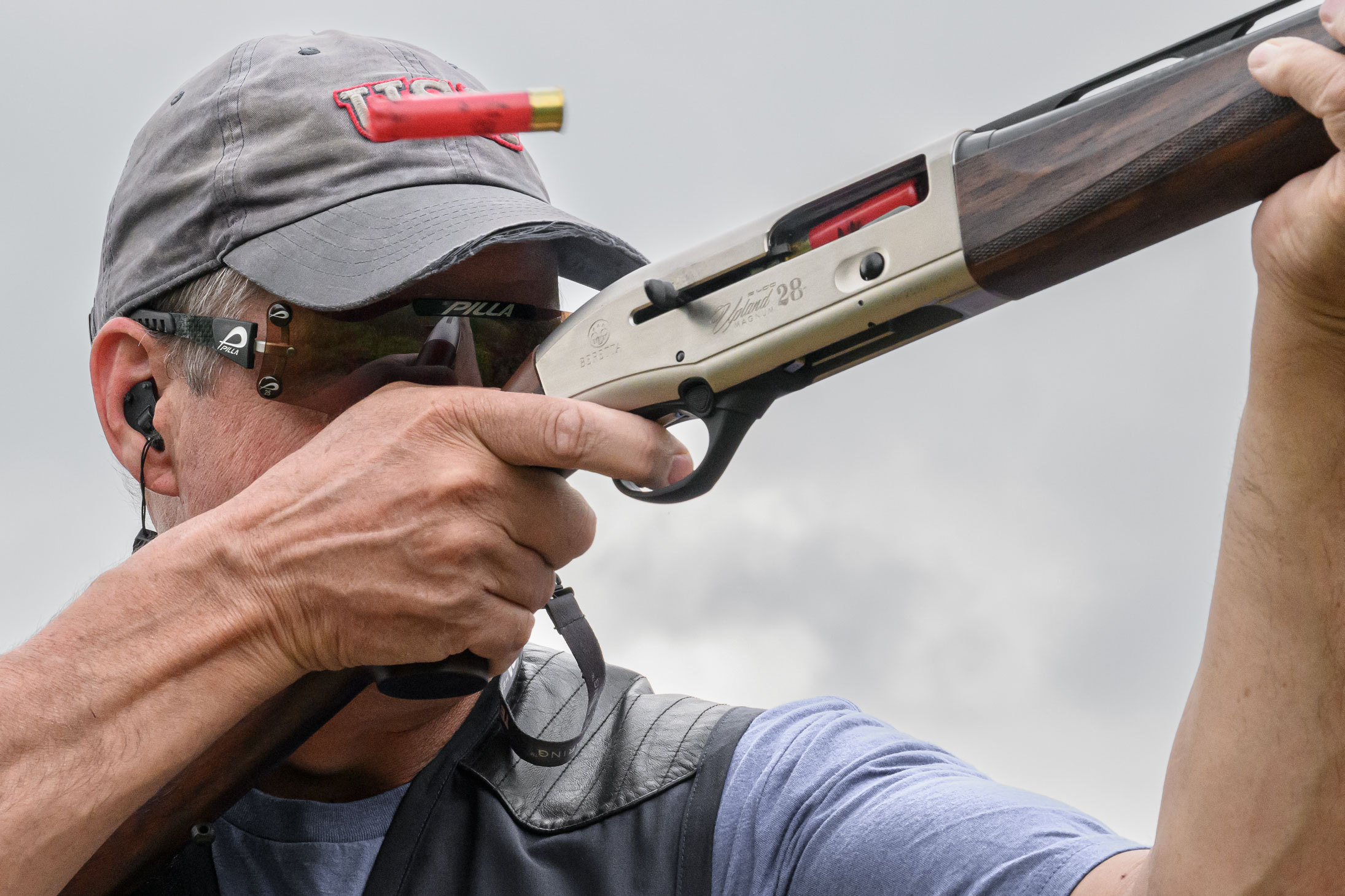
It’s natural to compare this Beretta to the Benelli SBE 3 28-gauge, and in some respects the A400 outdoes its Italian cousin. The safety on the A400, for instance, is beautifully integrated into the front of the trigger guard and couldn’t be more ergonomic.
In terms of handling, the A400 is a bit beefier than the SBE 3 (5.88 pounds vs. 4.49 pounds), and swung more evenly, though Executive Editor Natalie Krebs felt it was sluggish compared to the Benelli.
The Beretta loads easily and is a soft shooter. It cycled and fed well, though it did have a handful of failures to fire with Winchester AA loads, where it only dimpled the primers.
Issues like this kept us from awarding the A400 better scores. Where it plays to its strengths, however, it is a delight.
Beretta A300 Ultima Sporting
Report Card
- Performance: Very Good
- Design: Good
- Value: Very Good
Specs
- Action: Semiauto, gas
- Stock: Synthetic
- Gauge: 12
- Chamber: 3 inches
- Capacity: 2+1
- Weight: 7.79 pounds (measured)
- Length: 50.5 inches
- Barrel: 30 inches
- Trigger: 3 pounds, 14 ounces (measured)
- Pattern: 70/30
- Price: $1,149
Our gut tells us that this new shotgun from Beretta will be a hit with young target shooters, which is who it was designed for. At a reasonable price, an aspiring competitive shotgunner can get into a capable semiauto that should withstand many years of hard shooting.
It’s a big gun, has a 30-inch barrel, and weighs 7.79 pounds—which is in keeping with a sporting semiauto.
That heft helps it point and swing well and made it very capable on every type of target we took on. That said, the felt recoil was stiffer than we had anticipated, given its gas-piston action and overall mass. It wasn’t problematic—it just didn’t shoot as softly as we would have guessed.
Beretta cut costs on this gun in the choice of material in the stock and the quality of its fit and finish. To overcome that, Beretta adorned the A300 Sporting with bright green accents, which I think younger shooters will dig. It is also built at Beretta’s plant in Tennessee, which trims a few lira off the manufacturing costs.
While we gave the shotgun high marks for reliability, the front bead on our sample did come loose and eventually we unscrewed it from the rib because it wouldn’t line up correctly. That just left the mid bead on the rib—but if anything we shot the gun better without the front sight attached.
Over the course of the week this gun grew on us—not everyone was initially as charmed by it as I was—and we think this model might have a future as bright as its lime colored fittings.
Stoeger M3500 Snow Goose
Report Card
- Performance: Good
- Design: Good
- Value: Very Good
Specs
- Action: Semiauto, inertia
- Stock: Synthetic
- Gauge: 12
- Chamber: 3.5 inches
- Capacity: 10+1
- Weight: 7.74 pounds (measured)
- Length: 50 inches
- Barrel: 28 inches
- Trigger: 3 pounds, 10 ounces (measured)
- Pattern: 90/10
- Price: $929
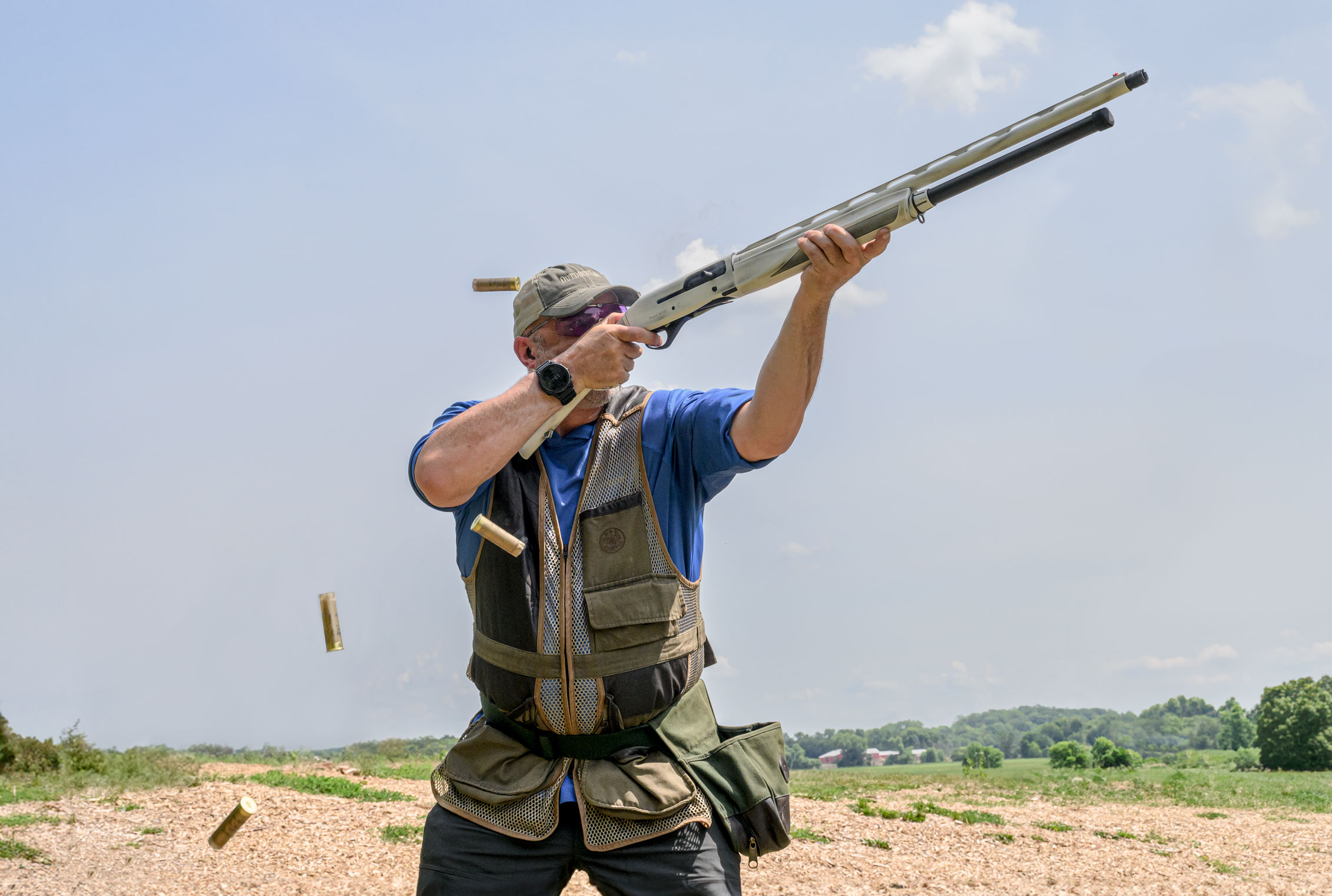
Hands down, the Stoeger M3500 Snow Goose was the most fun shotgun in the test. It chews through boxes of shells like Cookie Monster in an Oreo factory. Stuffed with 11 rounds of target loads and mounted solidly on your shoulder it is pure scattershot bliss.
Now it didn’t always cycle all 11 rounds in a quick volley—those light target loads sometimes failed to run the action—and when fully loaded it gives the term “muzzle heavy” a whole new meaning, but that didn’t wipe the grins off our faces every time we yelled “pull.” (In fairness, Stoeger does recommend at least a 1 1/8-ounce load to reliably run the gun and most of our target loads were 1-ouncers.)
The intended purpose of the gun, of course, is hunting snow geese, hence the extended magazine and 3 ½-inch chamber. The distressed white camo pattern that covers its 50-inch length between the recoil pad and extended choke tube is also a clue.
Given the growing popularity of snow goose hunting among younger waterfowlers, the $929 price point on the M3500 in light of its feature set makes it an attractive proposition.
Stoeger tricked the gun out with an oversized bolt handle and bolt release, three choke tubes, shim kit, padded sling, and prominent red front bead.
We were all pleasantly surprised by how well the M3500 swung and was able to get on targets quickly. And thanks to its substantial weight, “this baby rolls through targets,” tester Hank Garvey said.
The bolt release handle came loose, and then fell off, during the test, which cost it some points for “reliability.” And upon close inspection you can tell that the overall workmanship is a bit rough.
But, like a junkyard dog of questionable pedigree, the M3500 is a loveable mutt, and should be a faithful companion on those spring snow goose shooting fests.
Sauer SL5 Waterfowl
Report Card
- Performance: Fair
- Design: Good
- Value: Fair
Specs
- Action: Semiauto, inertia
- Stock: Synthetic
- Gauge: 12
- Chamber: 3 1/2 inches
- Capacity: 3+1
- Weight: 7.71 pounds (measured)
- Length: 49.5 inches
- Barrel: 28 inches
- Trigger: 4 pounds (measured)
- Pattern: 80/20
- Price: $1,779
We had high hopes for this shotgun, a pricey waterfowler from Sauer with eye-catching lines. Unfortunately, this inertia-driven 3 ½-inch 12-gauge didn’t perform as well as it looks. Its Achilles heel was how it failed to mitigate recoil, beating us up with even light target loads.
Much of the fault lies with its stock geometry. In order to get a proper sight picture, the shooter needs to bury their cheek into the stock, so much so that the gun slaps you silly when you pull the trigger. Now you might be able to mitigate some of this by altering the stock dimensions with the included shim kit, but we ran each gun as they came out of the box. The vast majority of shooters never fool with these accessories and have a reasonable expectation that the gun doesn’t require modification in order to run correctly.
Compounding this issue is the tacky insert Sauer incorporated into the stock. The purpose of that insert is to help the stock glide with reduced friction against your face while recoiling. But because the material is tacky, it grips the shooter’s cheek making the recoil feel worse.
The SL5 also lost points for the difficulty it had cycling target loads. Even though that’s not its intended purpose, it’s a drawback when a gun—especially one costing this much—can’t be counted on to reliably handle a round of skeet or 5-stand without a stoppage.
That said, we liked the layout of the SL5’s controls and the quality of its fit and finish–the retro Fred Bear camo is rad. We just wish the rest of the gun were as cool.
Stevens 560 Field
Report Card
- Performance: Fair
- Design: Good
- Value: Very Good
Specs
- Action: Semiauto, gas
- Stock: Walnut
- Gauge: 12
- Chamber: 3 inches
- Capacity: 5+1
- Weight: 6.83 pounds (measured)
- Length: 48.75 inches
- Barrel: 28 inches
- Trigger: 4 pounds, 7 ounces (measured)
- Pattern: 50/50
- Price: $499
The Stevens 560 Field is light and handy and moves well, but it doesn’t do a great job mitigating recoil—though that’s a sin one might be willing to overlook given its $499 price.
For a basic semiauto bird gun the Stevens 560 Field isn’t a bad option. It is easy to carry. It comes with a couple choke tubes. The trigger breaks at a reasonable weight. The laser-cut checkering on the fore-end and grip is effective and looks pretty good. And it shoulders and swings with authority.
When you inspect it closely you can see that the workmanship is in keeping with the sub-$500 price. The top rib isn’t machined with striations along its whole length. The barrel is wavy and uneven. (Which might account for the excessive number of fliers we noticed at the patterning board.)
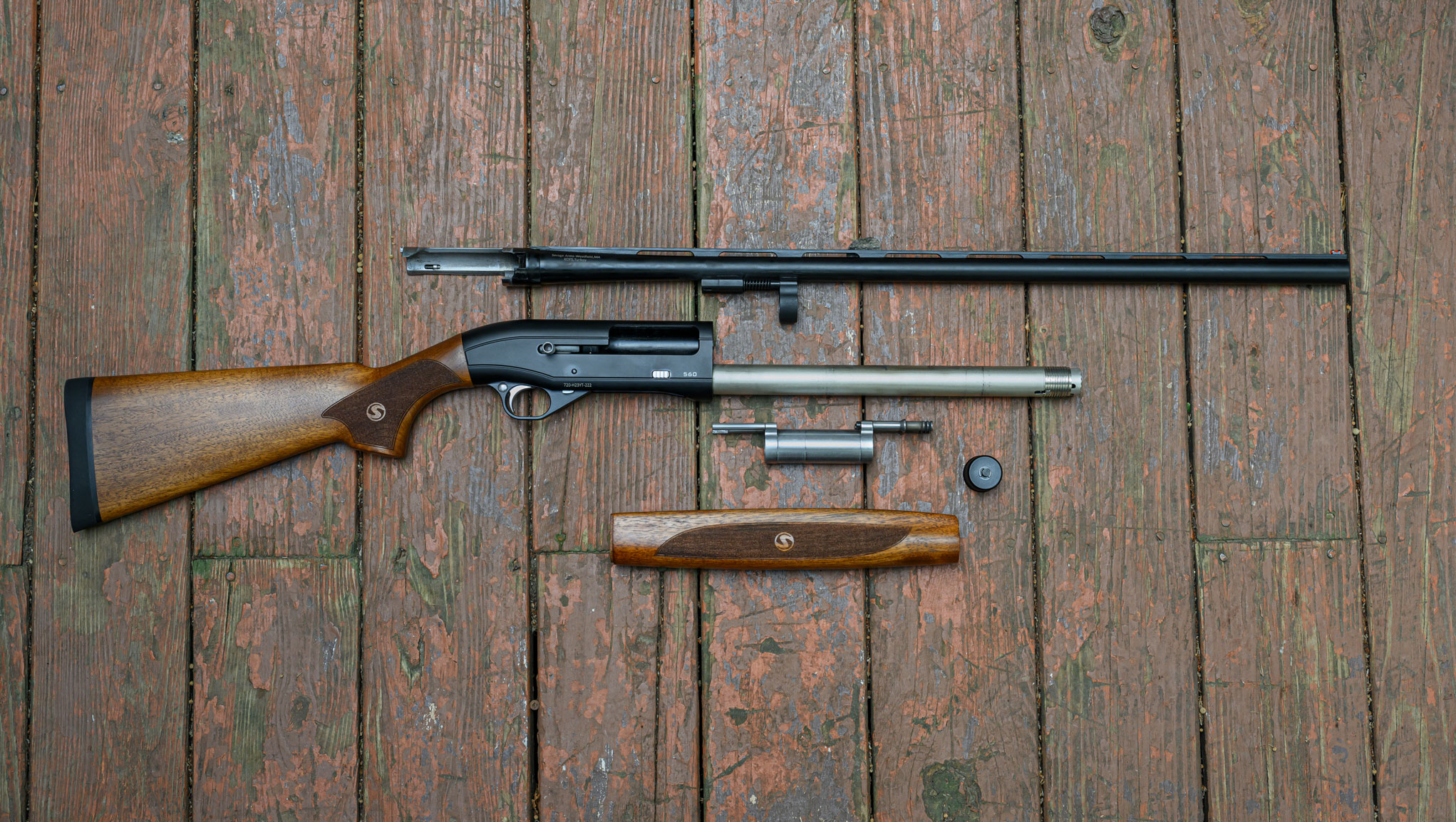
After we put a couple hundred rounds through it, it started to have issues chambering the first shell, and required cleaning to get it back in action.
The crossbolt safety is intuitive to use, though the bolt-lock tab is a bit tricky. The bottom of the receiver is beveled making the gun finger-friendly while loading, though one judge felt the square shell lifter kept grabbing his thumb while stuffing shells—but that might have just been a personal problem.
Mossberg 940 Pro Field
Report Card
- Performance: Good
- Design: Fair
- Value: Fair
Specs
- Action: Semiauto, gas
- Stock: Walnut
- Gauge: 12
- Chamber: 3 inches
- Capacity: 4+1
- Weight: 7.6 pounds (measured)
- Length: 47.5 inches
- Barrel: 28 inches
- Trigger: 3 pounds, 6 ounces (measured)
- Pattern: 100
- Price: $1,061
The gun test team was divided over the Mossberg 940 Pro Field. The idea of this gun is taking the 940 platform, which was designed with input from pro shooter Jerry Miculek for multi-gun competition, and configuring it for bird hunting.
For some of us, this landed in the gun in the “neither fish nor fowl” category, while others took a shine to its hybrid DNA.
The judges who liked it felt it handed well—“It has a nice, zippy, smooth action”—and was enjoyable to shoot, even when fatigued at the end of a long day of pulling triggers.
On the other side of the fence were those who found it clunky and inelegant. It isn’t a sweet shooter and not very fun on crossing clays. This camp had a difficult time imagining carrying it afield.
Visually, there’s no denying it is a bit of a brute and jarring. The lines on the receiver don’t blend at all with either the butt stock or fore-end. The bolt handle and bolt release tab are overly large and distracting. The safety on the back of the receiver is stiffer than it should be.
We also had concerns about the fore-end which flexed a lot when gripped tight. Its thin sided construction seems like a potential weak spot that might be prone to failure.
By the end of the week of shooting it also started delivering light primer hits, which cost it points.
The trigger on the gun is spongy, but adequate. It comes with a large recoil pad that does a good job dampening kick—we all found the gun to be fairly comfortable. The loading port is beveled and so the shooter can load the gun quickly.
In other words, it’s a mixed bag—and for $1,000 or more we aren’t sure the juice is worth the squeeze.
Tristar Viper G2 Pro
Report Card
- Performance: Fair
- Design: Fair
- Value: Fair
Specs
- Action: Semiauto, gas
- Stock: Synthetic
- Gauge: 12
- Chamber: 3 inches
- Capacity: 4+1
- Weight: 7.31 pounds (measured)
- Length: 48 inches
- Barrel: 28 inches
- Trigger: 4 pounds, 7 ounces (measured)
- Pattern: 80/20
- Price: $855
Tristar has put out some good guns in the past that we’ve praised for blending performance with value. The Viper G2 Pro fell short in both categories.
The felt recoil with this waterfowler, even with target loads, was unacceptably high—“obnoxious” in the words of Executive Editor Krebs. It suffered from deficits similar to what we detailed with the Sauer SL5 but beat us up even more. In order to hit clays we had to bury our face into the stocks to the point where the cheek slap was brutal.
Interacting with the shotgun in other ways wasn’t pleasant either. The safety was stiff and difficult to manipulate. Loading shells required excessive effort, and they often ended up on the lifter rather than in the magazine which jammed the gun.
Needless to say this colored our perception of the gun’s value, which along with the Sauer, was rated the lowest of the test.
Final Thoughts on the Best Shotguns
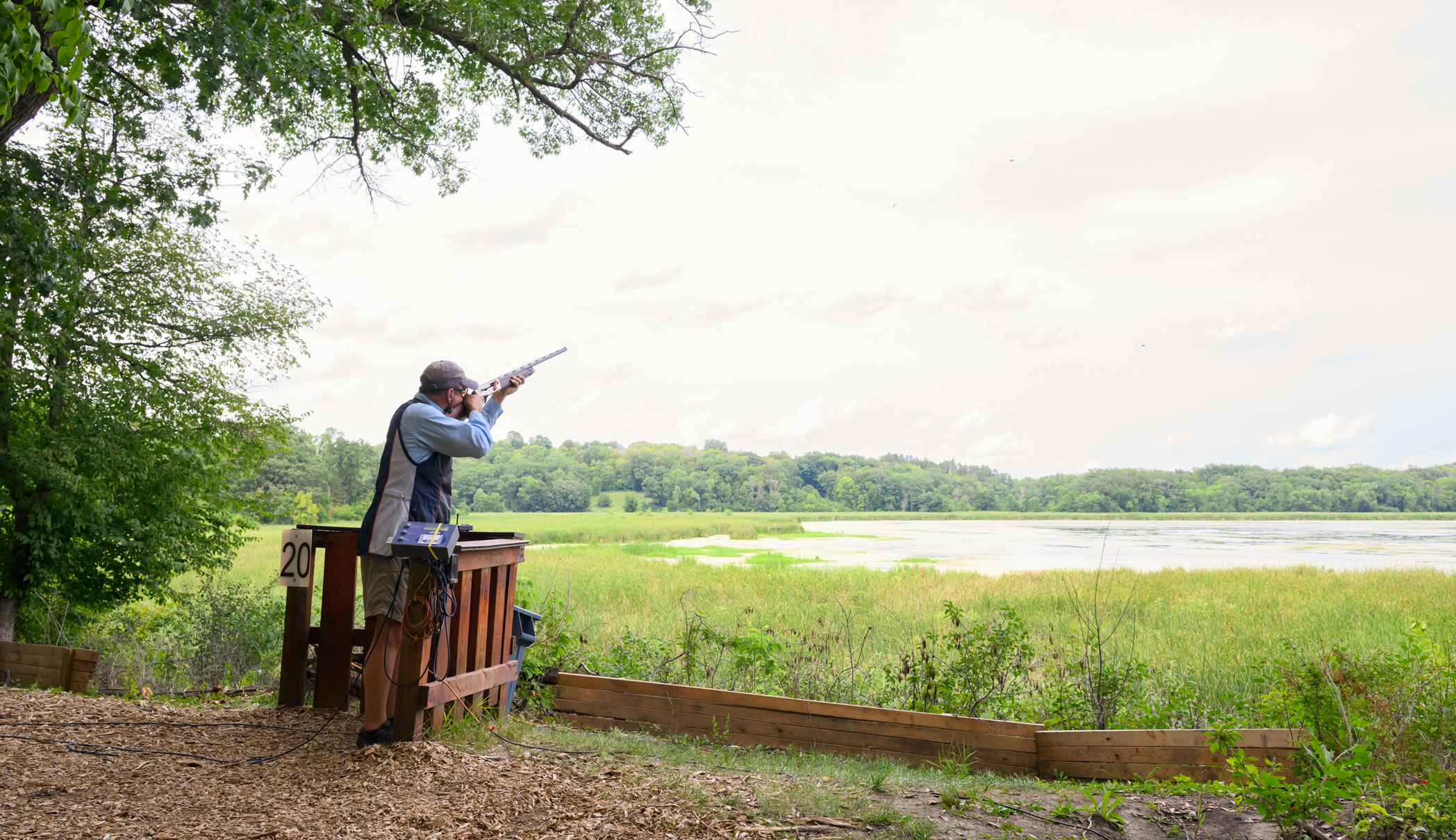
One common personality trait on the Outdoor Life gun test team is that we’re all optimists. Every gun we test we want to win. Our default perspective is to award scores that result in an “excellent” grade—but as you can see from the report cards of the best shotuguns, earning marks that high is exceedingly difficult.
When looking over this field of 14 guns it divides fairly cleanly into thirds. The top overall scoring guns—which include some of the most expensive—are fantastic shooters and pretty good values. While some, like the Retay Gordion and Benelli Montefeltro, are excellent general-purpose guns others, like the Benelli SBE 3 and Beretta Ultraleggaro are more niche.
The middle third of the pack consisted of a number of stellar values that also performed well, but that also had some shortcomings to consider.
And lastly, there were those that we’d have a difficult time recommending to anyone—because they handled like a brick on a pool cue, were less reliable than a sixth grader with a bellyful of cotton candy, or were priced completely out of line with what they could deliver.
About the Horse and Hunt Club

This year’s shotgun test was hosted by the Minnesota Horse and Hunt Club in Prior Lake, Minnesota, which is less than an hour south of the Twin Cities. The club sits on 600 acres that are set up for skeet, trap, five-stand, and a variety of sporting clays courses that are open to the public. It also has rifle and pistol ranges, 3D archery courses, and offers pen-raised bird hunts for members. There were plenty of blue-collar hunters and shooters there busting clays alongside us during our testing—which was perfect company for our field of (mostly) blue-collar shotguns.
